#and like. i had a good theological grounding to be able to push back on the BS nine times out of ten
Note
Why did God harden the Pharaoh’s? I’m in a Bible as Lit class and someone brought up “wouldn’t that be against free will,” and why did God let the Israelites stay it in slavery for so long. Why is God different in the Old Testament to the New Testament? I hope this doesn’t bother you, with all these questions
Okay, so there are several different questions here and I'm going to try to address them all. I'm sure I'll miss something somewhere, so other more knowledgeable friends feel free to add on. Follow-ups are also very much welcome.
First off, Bible as literature class! Yikes. I took a Bible as lit class for my English minor years ago and my experience was pretty much wall-to-wall frustration. It was mostly an exercise in coming up with the most transgressive reads on Scripture possible and that really upset me.
I hope that your experience is better than mine. However, assuming that the class is at a secular university, I'd still encourage you to be intentional about talking the things you cover in class over with knowledgeable Christians in your life. I certainly benefitted a lot from doing so, both in the sense that I got to vent a whole bunch and in that I got help contextualizing the secular perspectives within Christian scholarship.
That out of the way: The God of the Bible is the same in both the Old and New Testaments.
I do understand where you’re coming from. It’s not uncommon for people to find God kind of inscrutable in the OT when they're more used to reading the NT. I actually think that's a failure on the part of the contemporary church in the West; large swaths of the OT tend to be understudied among lay-Christians.
Systematic theology can help a lot here. I'm just going to hit a few really broad highlights, but I really can't recommend Wayne Grudem highly enough if you're interested in more in-depth reading. Lots of people start with Bible Doctrine, but my family happened to have a copy of his enormous Systematic Theology tome in the basement when I was in high school and I got a lot out of just poking through that a little at a time too. A few quick bullets though:
Across all the Biblical texts, God is love. He glories in kindness to his people, whether it's in the covenant with Abraham, the Exodus, the faithful ministry of the prophets, Christ's ministry/death/resurrection, or the promised coming of his kingdom.
God is holy; he gives the Law to the Israelites so that they can approach his holiness without fearing for their lives and he sent Jesus so that we can do the same. Both Isaiah and Peter react with fear and awe in the face of God's holiness.
God is just. By virtue of his holiness, he cannot allow sin to go unpunished. As modern westerners, we often chafe against this but has any of us experienced justice that was actually pure? Justice is a form of faithfulness, and the same God who sent his people into exile poured out his wrath on his own son in our place. He has promised that one day, every evil will face his perfect justice.
God is faithful. He keeps his Covenant with Abraham even unto the cross. In the OT he is faithful husband to an adulterous people. In the NT he tells us that when we are faithless, he remains faithful, for he cannot deny himself.
Lots of other characteristics but this answer is going to be long enough as it is. The only way to get a real sense for the continuity within the Bible is to read the whole Bible with an eye towards the continuity.
The reason that God is more approachable in the NT than the Old is that he became human. In the Incarnation, all of that holiness and justice and faithfulness and love that was God came to earth in our perfect likeness so that he could live beside us and die for us. God is certainly easier to approach in light of Christ's work, but he is utterly the same as he ever was. Read the Transfiguration and tell me that isn’t the God of Mount Sinai. Read John 1 and tell me it doesn’t remind you of the end of Job. Read the Gospels, Hebrews, and Revelation and play spot-the-OT-parallel. It's beautiful.
Why did God leave his people in slavery for so long? You could ask the same question about the Babylonian captivity and even about why Jesus waits to return and finally defeat Death. Why does he wait? Why let his people suffer?
Well. God is sovereign and he only permits evil to the extent that it ultimately accomplishes the very opposite of what it intends. Because the Israelites were slaves in Egypt, the Exodus was able to occur. The Exodus glorified God in extraordinary fashion, both among his own people and to the peoples of the ancient world. It was also a necessary type and precursor to Jesus's work on the cross. I don't think it's an overstatement to say that redemptive history rests on God's work in the Exodus, which is itself contingent on a period of slavery in Egypt.
“How long, O Lord” and “Come Lord Jesus” are the same sentiment in different words. We are still in exile, even now. We are chronologically exiled from the place where we belong, the New Jerusalem, and we mourn because we live in a fallen world in which sin and death can still hurt us. We can ask, just as the Prophets once asked, why God waits to vanquish the Enemy, extract suffering from the world, and restore our years that the locusts have eaten. And in each case (the slaves in Egypt, the Babylonian captivity, and the period of waiting for Jesus to return), the answer is that God does not fix it yet because He is doing something bigger!
Regarding Pharaoh's heart: this is basically a question of human nature. The easiest way that I can articulate it off the top of my head is using Augustine's fourfold state of man:
Prior to the fall, man was able either to sin or not to sin (posse peccare, posse non peccare)
The natural state of man after the fall is one in which he is unable not to sin (non posse non peccare). This was Pharaoh's state.
Following the work of Christ, regenerate man is able not to sin (posse non peccare)
In eternity, glorified man will be unable to sin (non posse peccare)
When we talk about man's will, we must acknowledge that our wills are subject to our nature. In other words, Pharaoh was a natural, fallen man. His nature was inherently sinful and his heart inherently hard.
What we've got here is sort of a "Jacob I have loved but Esau I have hated" situation. Pharaoh, in his natural state, had a hard heart and a natural enmity with God. God did not intervene to give him a heart of flesh. My people I have loved, but Pharaoh I have hated.
Not a perfect parallel, but I think it serves its purpose. The point is that God's sovereignty isn't in conflict with man's will, since our wills are a function of our natures. Man behaves however his nature inclines him to behave at any given time. We call this free will; however, God is entirely sovereign over all of it.
This is definitely a long, messy answer, but like I said, feel free to continue the conversation. I've got some biochem to work on, but I'm always happy to talk theology :)
#Secular Bible as lit classes really are a quagmire#mine was basically where I decided that I straight up do not care what non-Christians have to say about the Bible#(in the scholarship sense I mean)#if you don't have skin in the game then i couldn't care less what you think on authorship/characterization in genesis/weird subversive take#on ruth/Job being internally inconsistent/God's gender/the purpose of the parables/whatever other nonsense#sigh#and like. i had a good theological grounding to be able to push back on the BS nine times out of ten#my prof actually called me the most engaged student she'd ever taught which was pretty hilarious#but i was FURIOUS on behalf of the other Christians in the class who by and large had relatively shallow foundations as far as i could tell#like one girl was seriously doubting whether God was good when we did the prophets because of the way it was presented#i went to the prof's office hours one time to pick a fight (long story) and she told me that she's had numerous students over the years#that renounced their faith after taking her class#i spent the whole semester praying for all the names on the class roster#ugh i could rant about that class forever#meanwhile! no discussion of the ACTUAL literary merits of the Bible which are awesome!#the poetry the reoccurring motifs the deft use of metaphor the beautiful elevation of theology to art#i wanted to talk about that!#and that wasn't what the class was about#this was years ago and i'm still mad. sorry#maybe that'll be a separate post one of these days#ask me hard questions#only thou art holy
41 notes
·
View notes
Text
White Knuckles
Awhile back, I asked y’all to send me a song so I could take its energy, lyrics, and/or feeling and write you a 1,000-word Clexa fic.
This one shot meandered way beyond 1,000 words. It’s based on White Knuckles by Tegan and Sara, as requested by @damiana-atx.
Angsty academia AU. No content warnings except for some swearing.
You can also find it on ao3.
-----------------------------
“Fuck, this is good,” Clarke said aloud to no one as she tossed the journal on the table. She leaned back in her chair. Godlessness Centered: Negotiating Queerness in The Left Hand of Darkness by Alexandria J. Woods, PhD. When Clarke had first picked up the journal, she scoffed. The Left Hand of Darkness? Really? And queerness? How overdone.
But it was brilliant. A discourse on Le Guin’s own spirituality and how it defied casual dualities.
I should have thought of that.
She looked at her watch. Twenty minutes.
---
Lexa smoothed the lapels on her blazer, though they were already perfectly flat. She gazed at herself in the hotel mirror, staring at the buttons on her shirt. She had a choice to make—the choice of the one awkward button. Button it, and she would seem, well, buttoned-up, uptight. But unbuttoned, it was a bit...revealing. There was no middle ground.
She pushed her glasses up on her nose and took a breath. Then buttoned the button.
---
They met in Bloomington, Indiana. All the sci fi literature conferences seemed to be in random small cities in the Midwest. They were strange events. Mostly men in khaki and tweed carrying beat-up leather satchels, experts on Vonnegut and Wells (H.G., that is). But there was also the overt geek element. Undergrad boys carrying frayed copies of Asimov and Gaiman, their laptops covered in Star Trek and My Little Pony stickers, and the occasional girl wearing a Strong Female Character t-shirt.
Then there was Lexa, sharp in a plain black cashmere sweater and grey herringbone slacks, her glasses suggesting both intelligence and the ability to break you. The geeks followed her but kept an admiring distance.
Clarke, for some reason, seemed more approachable. As she sipped her gin and tonic at the hotel bar, the kids (as she called college students) would creep up to her, their eyes down.
“Dr. Griffin?” they’d ask.
“Call me Clarke,” she’d say, smiling.
“I just had some questions on your takedown of the Darkover series.”
Clarke would always give them about twenty minutes then politely end the conversation, turning back to her drink.
She had had three such conversations when she felt a tap on her shoulder. Clarke didn’t mind the attention, but she was getting tired. She spun around, ready to dismiss herself.
“Dr. Griffin.” Lexa stood above her.
“Dr. Woods,” Clarke replied, nodding politely. She had read all of Lexa’s work. She had to. They were two of the only feminist sci fi lit scholars who were regularly publishing. But they’d never actually met.
“I don’t really prefer the term ‘doctor.’” Lexa said, looking just past Clarke. “It’s a little....” She didn’t finish her thought. After a moment she tilted her head. “Do you really think we should stop reading Bradley because of her scandal?”
Clarke put her drink down. “Scandal is kind of an understatement. And I didn’t say we should stop. I just said it’s hard.”
Without invitation, Lexa sat down at Clarke’s table. “If we bring every artist’s personal life into how we engage with their work, we probably won’t be able to enjoy anything.”
Clarke raised an eyebrow. “I never took you for a modernist.”
“That’s not what I’m saying.”
“Then what are you saying?”
“That sometimes shitty people create amazing art.” Lexa’s eyes lit up with her smile, like she was issuing a friendly challenge.
“Are you flirting with me?” Clarke returned her version of the same smile.
Lexa sat back and shrugged. She took a sip of her martini.
---
A few hours later, Clarke was sprawled across Lexa’s bed looking up, her hair in tangles across the pillow, a corner of the sheet pulled over her midsection. Lexa was curled up next to her, sweaty and wondering what just happened. She took a few breaths, looking for words. She squinted to herself, couldn’t think of anything to say. She felt Clarke shuffle a bit and prepared for the awkward banter that would come when they’d get up to look for their clothes.
“Do you believe in God?” Clarke asked instead. She didn’t get up.
“Pardon?”
“Do you believe in God?” Her tone was so casual.
“I...I don’t know.” Lexa looked up at the ceiling. She suddenly felt cold and reached down for a blanket. “Why do you ask?”
“I think I do,” Clarke said, not answering the question.
“Why?”
“I just look around this world, and it seems pretty incredible to me. Like it wasn’t an accident. Someone had to have created all this. Created us. Then made us creators.” Clarke shook her head and looked past Lexa. “It all seems like such a miracle.”
“Are you a Christian?” Lexa felt her face crumple.
Clarke laughed. “I don’t know. I do like the idea of the trinity.”
“When I grew up, my parents took me to one of those born again churches.” Lexa looked down. “It was mostly Jesus. I mean, I know what the trinity is, but…” Why was she telling her this?
“No, that’s not what I mean.” Clarke shook her head. “Not like God as some guy who makes you love him or else you burn in hell. That’s bullshit.”
Lexa squinted.
“The trinity. It’s like a dance between these three ways God reveals herself.” Clarke smiled. “It’s beautiful actually.” She looked at Lexa. “Did you ever read A Wrinkle in Time?”
Lexa side-eyed her. “Clarke, I’m a sci fi scholar.”
“Okay, so there’s Mrs. Who, Mrs. Whatsit, and Mrs. Which…”
They stayed up the rest of the night, moving from L’Engle to Shelley to Jemisin and the spiritual worlds of their stories. Evil and suffering, goodness and hope. Retribution, sacrifice, and justice. Beauty and joy. Mouth to neck, hands to curves, skin to skin.
By dawn, Lexa had found God.
---
Lexa went back to UC Irvine and Clarke returned to her adjunct job at Georgetown, but they emailed constantly. Long, meandering messages about particular chapters of The Stone Sky and Spinning Silver. Clarke sent her Marilynne Robinson essays, and Lexa responded with questions. Together, they laid theologies over imagined worlds, mapped them out and connected them to other imagined worlds. They took down Ender’s Game, built up The Hainish Cycle, and even let themselves dabble in Stardust, which they both had to admit they secretly admired. Back and forth, tens of thousands of words over the course of months. They only talked on the phone a few times, but the emails were constant.
Not long into their messages, Clarke had mentioned how her father had died when she was young. Lexa hinted at being on her own at age 16. These details were wrapped in blankets of analysis and metaphor, the theological undercurrents of the imagined worlds they studied, the anthropology of beings who only existed on pages and in minds.
They made plans to meet in Cleveland to present together at a lit crit conference. A week before, Lexa bailed. “Sorry,” the text said. “An emergency came up.”
“Everything okay?” Clarke responded.
Nothing.
The conference was rough. Clarke knew it would be, but she thought she’d have Lexa’s powerful presence demanding attention. The lit crit crowd all secretly loved what they called “genre” fiction—sci fi and fantasy—but they publicly derided it as “unserious” or “not literary.” She held her own, but it wasn’t fun.
She texted Lexa when she got back to her hotel room. “Wish you had been here. Same straight white male bullshit as usual.”
Silence.
“Did I say something wrong?” Clarke texted a few days later. At that point, though, she knew Lexa was gone.
A heaviness set in on her. Clarke reread their messages looking for hints, but Lexa’s words seemed wide open, even joyful. What happened?
She immersed herself in a chapter she was writing for a textbook on book fandoms and lecturing on feminism and postmodernism in Harry Potter—not her favorite topic, but it was a popular course. She had almost let herself forget about Lexa when, six months later, she was flipping through Foundation: The Journal of Science Fiction and saw her byline in the table of contents. Justice & Joy: The God Revealed in the Feminist Imagination. By Alexandria J. Woods, PhD.
Clarke turned to page 137 and ran her eyes down the columns. She bit her lip. The essay was essentially a catalog of their emails, one idea bridged skillfully to another by Lexa’s pointed and lucid prose. But they weren’t just Lexa’s ideas. They weren’t just Clarke’s, either, but a stream of their thoughts flowing together like a river. It was beautifully done.
Clarke didn’t notice that her hands were balled into fists until she felt her nails cutting into the skin. She opened her laptop and pulled up the messages. Lexa had been careful to rephrase Clarke’s words, but it was all there, even with citations of Marilynne Robinson. The Death of Adam.
Clarke pounded out an email. How dare you...couldn’t even ask for me to be a coauthor...you hadn’t even thought about these things until you met me. She knew Lexa wouldn’t see it. She probably had blocked her address. She didn’t bother hitting send.
Her face fell into her hands. She remembered that night in San Diego. Lexa’s smile—that curiosity despite herself. The way her hands traced the skin over Clarke’s side.
That woman wouldn’t have done this. But there it was. Twenty-six pages of shared conversation now claimed for Lexa only.
---
Clarke’s department was buzzing about it the next day. The religious studies chair was also a huge geek who kept up with Foundation, and he had been blown away by how seamlessly interdisciplinary the article was. “I hadn’t thought to connect the Christian trinity and A Wrinkle in Time, but it’s really so obvious when you think about it.”
Clarke seethed. She thought about printing up the emails, sending them to Foundation and the UC Irvine Disciplinary Committee, but something stopped her. Allegations of plagiarism would ruin Lexa’s career as a scholar. And was it really plagiarism? Clarke wanted to be sure, but she wasn’t.
So she wrote instead. A deep and cutting rebuttal highlighting where Alexandria J. Woods’ religious arguments were rudimentary at best, illustrating how shallow her connections were, and then plunging further, mining Catherine Keller and other theologians for an even deeper exploration of the worlds of Butler and Clarke (Arthur C., that is). Foundation published her essay the next quarter. Lexa answered, bringing in Buddhism and Humanism. A spotlight grew around their debate, so they continued writing—back and forth between literary, cultural, and religious journals. WIRED magazine picked up the story: Feuding Feminists Shifting the Sci Fi Landscape.
That’s when the invites started rolling in. A conference on spirituality and pop culture invited them to speak on a panel together, but Clarke refused. She couldn’t bear to see Lexa in person. Instead, she accepted an invitation to lecture at NYU while Lexa spoke at Cal.
Clarke’s classes filled with long waitlists every semester, her success intertwined with Lexa’s and their endless intellectual feud. They both thrived. Lexa’s ideas sharpened Clarke’s, and Clarke’s sharpened Lexa’s. She couldn’t admit it, but she needed Lexa as much as she despised her.
---
Lexa was in her office when the call came.
“Dr. Woods?” A male voice.
“It’s Professor Woods.”
“Excuse me, Professor Woods,” he corrected himself. “This is Dr. William Porter at Georgetown. The chair of the Department of English.”
Lexa felt something jump in her chest. “Good morning.”
“I’m calling because a very generous donor has recently endowed a tenure-track professorship here specifically for women in science fiction studies.”
“You’re kidding me.” it felt like a prank, and a mean one at that. Lexa had never heard of such a thing.
“Uh, no.” Dr. Porter seemed thrown off. “We’re inviting only a few people to apply, and you’re on our short list. Is this something you’d be interested in?”
They hung up with lingering plans to arrange flights and meetings.
Lexa sat for a few minutes, her fingers tapping idly on her closed laptop. Clarke would be one of the other candidates—and maybe the only other candidate—she was sure. She looked down and shook her head, thinking back to that day when she made the worst decision of her life.
She had printed out some of the emails she had sent Clarke to reference them against some short stories when the dean knocked on her door. He noticed a copy of L’Engle’s Walking on Water open on her desk.
“What’s that about?” he asked.
“Uh, just a side project I’m working on.” Her face burned with the exposure of her new interest in religious studies.
“Mind if I look?” he asked, picking up one of the print-outs before she could answer.
She bit her lip as he read, his forehead creasing.
After a few minutes, he looked up. “Professor Woods, this is good stuff.”
She took a deep breath and let it out. “Thank you. I’ve been working with Professor Griffin at Georgetown—”
“But these are your words, right?”
“Yeah, what you’re holding. That’s mine.”
“You need to publish this. It could be really good for you and the department.”
“Yeah, Professor Griffin and I—”
“Lexa,” he said in that kind but firm I’m-A-Man-In-Charge voice, “there’s a distinction to be made between attribution and inspiration. I’m inspired every day by the ocean, by James Joyce.” Lexa hid her contempt. Scholars who pretended to understand Joyce were pretentious liars. “But I’m not citing them.”
“Dr. Titus.” Her voice was firm. “I couldn’t have written that without Professor Griffin.”
“Professor Woods.” He looked her straight in the eye. “This department doesn’t need a co-authored paper with someone from Georgetown. We need a win.” He tapped the paper. “These are your words. Are they the product of a broader conversation? Sure, but what isn’t?” He looked out the window at the budding trees. “We took a chance on your genre work. And I’m seeing some good stuff. But I need to see more if we’re going to keep you on.”
Lexa looked past Dr. Titus and took in a silent breath. Jobs in her specialty was rare. UC Irvine had invested more than most schools to create a department where someone like her could thrive. She nodded.
“Get me an abstract and outline next week,” the dean said. “The managing editor at Foundation is a former student.”
When he left, she took off her glasses and rubbed her eyes. She would need to cancel her panel with Clarke in Cleveland. She wasn’t sure if she’d ever be able to look at her again.
---
Clarke let out a deep breath as she stepped into the crisp fall air. It had been a long day of interviews. She stopped on the stairs. She knew Lexa was close by. She had to be. They were the two people in the country most qualified for the job. She’d been on these interview panels before. Two, sometimes three, a day, candidates rotating between deans and panels. Clarke was surprised she hadn’t seen her yet.
She shook her head. Maybe she should have said something about that first paper. The job would be hers if she had. But would she even be considered without that paper? It had launched her career. Her public debate with Alexandria J. Woods, PhD, got her lectures around the country, a longform article in The Atlantic, and the keynote spot at conferences that two years ago would have never taken her seriously. Their refusal to appear together added to their mystique. Geeks and academics alike lined up on reddit and twitter to take sides.
Her success was bound to Lexa’s, two sides of the same double helix.
She bundled a scarf around her neck. It didn’t matter where Lexa was. Clarke loved the work she did, and she had rocked the interviews. But she was tired. It was time for a drink. She pulled out her phone to call a Lyft. Something about the fading purple sky changed her mind, though, and she decided to walk.
The cobblestones on O Street felt somehow comforting under her feet. Solid. Old. Not going anywhere. She thought about calling Dr. Reyes from the engineering department to join her—Raven was always good for either a loud night of much alcohol or a quiet night of raw, stinging truth—the latter of which was why Clarke had never told her all that had happened with Lexa. She shook her head. Maybe she just needed some gin and silence.
She sat at the bar at L’Annexe and ordered a Tom Collins. Bartenders always smiled curiously at her when she ordered one. Funny, you don’t look like a 75 year-old man to me. She’d smile back impatiently. Just make my damn drink. When the drink arrived, she took a sip and let out a deep breath as the gin started to glow through her. No one can fuck up a Tom Collins. It was simple and always felt good and sharp and bright going down.
She was halfway through her drink when a man sat next to her and ordered a scotch. Clarke glanced at his plaid scarf, wool sweater, and worn leather shoulder bag. Definitely a TA. He noticed her looking at him and smiled.
“I’ve seen you,” he said. “You teach that Harry Potter course.”
Clarke’s stifled a sigh. “That’s me.” She tilted her head back and drank the rest of her Tom Collins in one swig.
“Can I get you another?”
“No,” she said, picking up her bag. She made eye contact with the bartender. “I need to pay.”
“Whoa,” the man in the scarf said, raising his hands. “I’m just trying to be nice.”
“And I was just trying to be alone.” Clarke nodded towards the guy sitting on the other side of him. “Maybe you can be nice to him.” She dropped some cash on the check that had arrived and made her way to the door.
It was darker outside than when she’d arrived. And colder. She buttoned her wool coat and started making her way down Pennsylvania Ave. towards the bus stop.
---
Lexa was sipping a Syrah at a window table when she saw Clarke walk by outside. She took in a breath, remembering how Clarke’s eyes got soft when she asked, “Do you believe in God?” She shook her head. She could just let her keep going, and they could go on avoiding each other forever. Unless Lexa got the job.
Shit.
She grabbed her coat, leaving a $20 under her mostly full glass. By the time Lexa got out the door, Clarke was halfway down the block, almost lost in a crowd of loud students. Lexa didn’t button her coat, and it billowed out as she jogged down the street.
“Clarke!” she shouted as she got closer. She saw Clarke stop, her back straighten and stiffen. She didn’t turn around.
---
Clarke wanted to be angry. When she heard that voice, she wanted to spin on her heel and unleash a cascade of expletives that would make the passersby uncomfortable. She not only wanted Lexa to hear the words traitor, cheat, betrayed, she wanted her to feel the force of them rip through her body like a landmine.
But she froze. When she heard that voice, she felt tears sting at the corner of her eyes. She felt a slow storm in her chest, all rain and no lighting. She closed her eyes. She wanted to be angry, but all she felt was heaviness. She held her breath and waited.
When she opened her eyes, Lexa was in front of her, her eyes uncertain and her arms folded in front of her. “Hey…” she said after a few moments.
Clarke bit into her lip, hoping not to draw blood. She looked up, her blue eyes blazing, about to spark. She could tell Lexa was waiting for her to say something, so she stayed silent.
Lexa nodded. “I’m so sorry, Clarke.” She didn’t know what else to say.
Clarke’s eyes locked on Lexa’s, but she refused to respond.
“I don’t expect you to understand...” Lexa trailed off. “It wasn’t right. It wasn’t fair.” She looked past Clarke to a stoplight turning from yellow to red.
Lexa’s open coat revealed a gray plaid suit, smart and uncompromising, the top button studiously and chastely buttoned. So she had interviewed today. In this moment, though, it all felt wrong. Lexa seemed so small to Clarke. She wasn’t the woman she met at the hotel that night, but she also wasn’t the woman who submitted that article. This woman was drawn in on herself, her hair falling around her face like a curtain. Clarke remained silent.
Lexa sucked in her lips. “I know you probably hate me, and I get it.” She looked down. “I hate me, too.”
“No.” Clarke’s voice was deep and quiet. “You don’t get to do that.” She felt confused when she saw a shadow of relief cross Lexa’s face.
“You’re right,” Lexa said. “That’s not fair.” She took a long, deep breath and let it out. “I’m going to tell them.” She looked Clarke in the eye. “I’m going to tell Georgetown, and I’m going to tell Foundation. I’ll—”
“Don’t.” Clarke cut her off. “It’s done.”
“But—”
“Fuck you, Lexa.” She barely looked at her as pushed past, a slow fire burning through her as she walked briskly towards Dupont Square.
---
Lexa was freezing by the time she got back to her hotel room. She had stood on the sidewalk for a long time, watching Clarke get smaller and smaller. She didn’t know what she’d been expecting. Forgiveness? Punishment? Clarke had given her neither, which is what she knew she deserved.
She had never written a paper more carefully, never thought about the ideas so closely, never danced so delicately around sentence structure and tense. In a twisted way, she was proud of it. It was sophisticated but accessible, and completely defensible. Even if Clarke had tried to accuse her, she was sure she would have won.
She shook her head sharply. That’s not who I am. But it was. She was intelligent and ambitious and ready for a breakthrough. She knew Titus had been threatening her, but she also knew that what she had been writing with Clarke was good. Really good. She had never felt so alive in her work as when she was in conversation with Clarke. No one had ever challenged or inspired her like that. Even after that first paper, her debates with Clarke from essay to essay were electric, almost feverish. Clarke tapped something in her that was insatiable.
She picked up her laptop and opened some of the first emails she and Clarke had exchanged after Bloomington. She couldn’t help but smile. There had been a giddiness to them, this breathless excitement to constantly share new discoveries, interesting connections. They had sent seven, sometimes eight, messages a day. Thousands of words.
And that night in Bloomington.
She closed the laptop. Was it worth it? For months, Lexa had tried to convince herself that it had just been one night, that she didn’t even really know Clarke. When she saw Clarke on that sidewalk tonight, though, she knew that was all bullshit.
They had been falling for each other the best way they knew how. Lexa had betrayed all of it.
—-
Lexa was sitting on the floor outside Clarke’s office when she arrived the next morning.
Clarke sighed. “Seriously?” She didn’t look at her as she slid her key in the lock. “What are you doing here?”
“I had a meeting to cancel.” Lexa shrugged, not getting up.
Clarke pushed her door open. “I don’t have anything else to say to you, Dr. Woods.”
“I withdrew my name.”
Clarke froze. “Why?” Clarke noticed jeans and a sweater under Lexa’s coat. Her hair was pulled back in a messy bun. She was serious.
“You know why.”
Clarke’s eyes narrowed. “You didn’t have to do that.”
“Yes, I did,” Lexa said steadily as she stood up. The smallness from the night before was gone. She stood tall, her shoulders thrown back. “I don’t know who else they’re interviewing, but I’m not your competition anymore.” She swallowed and looked into Clarke’s eyes. “I don’t want to be your competition anymore.”
Clarke let out a breath she didn’t know she was holding. She wanted to say, Good luck, Dr. Woods, and close the door behind her, but instead she felt herself pushing the door open, heard herself saying, “Come in.”
Lexa bit her lip. “You sure?”
Clarke nodded and ushered her in. The door clicked as it closed behind them. Clarke set her bag down and sat at her desk. She shook her head, frustrated. “I just want to hate you. That’s all. I want to tell you to fuck off, and I want to go on with my life.”
Lexa sat in the reading chair in the corner of Clarke’s office. She nodded, looking down at her hands. “Then why don’t you?”
Clarke huffed, a cynical laugh. “I can’t get away. You’re everywhere.” She threw up her hands. “I saw you on the fucking New Yorker site this morning. How did you land that?” A rhetorical question. “I assign your essays for my classes. I have to. I hate how good you are.”
“You’re good, too, Clarke,” Lexa said quietly. She looked up. “Very good. I keep researching and writing because you keep responding.”
Clarke closed her eyes. She knew it was the same for her, but she didn’t want to say it. Finally she looked up. “Why did you do it?”
Lexa looked past her at Clarke’s diplomas on the wall. Undergrad at Cornell. She shook her head, almost said I don’t know, but she didn’t want to lie. “I wanted to do something big.” She gathered the courage to look at Clarke’s face. “I wanted to do it with you, but my dean pressured me to take solo authorship.” She closed her eyes, ashamed. “And I was a coward.”
“Yeah.” Clarke leaned back in her chair. “You were.”
Everything that came into Lexa’s head to say felt like an excuse, so she kept her mouth shut. They both did, the loud ticking of the cheap clock on the wall cutting through the silence.
Finally Clarke shook her head. A corner of her mouth curved up. “It was really beautifully done.”
Lexa looked up, her head tilted.
“I was so fucking angry, Lexa.” Clarke breathed out like she was letting something go. “I should have been a coauthor, but, fuck, it was well written. Like it was on a whole other level.”
Lexa’s green eyes were bright as they locked in on Clarke’s. “You inspire me, Dr. Griffin.” She sat back. “It’s what I wanted to talk to you about.” She paused and sucked in her lips. “I think we should write a book together.”
As soon as Clarke heard the words, she knew it was a good idea. Maybe the best idea. But all that would come out was, “Fuck you, Lexa.” It was almost a laugh.
Lexa’s face was stone, but her eyes were alive. “An editor already approached me. If I brought you on…”
“You can’t buy your way out of the shitty thing you did, Lexa.”
“That’s not what I meant.” Lexa ran her hand over her hair then looked up, her face suddenly soft. “I meant it, Clarke. I’m better with you.” She shrugged. “And I think you’re better with me, too.”
Clarke bit her lip. She took in a heavy breath, and let it out in a long sigh. She stood up. “Come here.”
Lexa squinted her eyes.
“Just come here, please. You owe me that.”
Lexa stood up in front of Clarke. Clarke lifted her hand to her face and leaned in, her lips barely touching Lexa’s. Lexa didn’t move, but Clarke felt her shiver. She leaned in and kissed her softly. Then she pulled back.
“I just…” Clarke didn’t know where the end of that sentence was supposed to go, and she didn’t tried to find it. Instead, she lifted her eyes and looked at Lexa as her chest rose and fell, rose and fell.
Lexa held her breath.
Finally Clarke smiled, almost laughing at herself. “That’s not a yes, Dr. Woods. But it’s not a no.”
115 notes
·
View notes
Note
What were some parts of seminary that you liked, versus ones you didn’t? I’m thinking about my future (read: freaking tf out) and I know I want to study theology in some way, I’m just not sure how exactly, ya feel?
Thanks for the question! Your mileage may vary: I went to a Princeton Seminary, which I would categorize as a theologically/politically moderate, academic, traditional Western-style seminary. Seminary culture varies WIDELY from school to school, so keep that in mind when choosing between, say, a Princeton, which may be a more insular academic community focused on research and internships, and a Fuller, which may be a larger community more integrated with the surrounding city concerned with practical training for missionaries, worship leaders, and Christian artists. This is NOT to say that you can’t learn to be an awesome worship leader at PTS (I know them) or an awesome theology professor at Fuller, but make sure you shop around for your particular cultural, career, and academic needs.
Things I Loved
The residential experience. Nearly all students at PTS live in beautiful on-campus housing or in apartments specialized for families with children just a few miles away. Living a few minutes walk from the library, my professors’ offices, and the chapel was amazing, especially since students at PTS tend to be sociable with the others who live on their hall. I would often spend my evenings studying with friends in their dorm rooms, and since everyone on campus at any given time tends to eat their meals in the cafeteria together, I formed a strong clique of ten or so people who unpacked my readings + spiritual crises with me at the lunch table.
Spiritual friendships. I was able to make deeper friends than ever before in my life from a variety of denominational and theological backgrounds. We saw each other through vocational shifts, prayed with each other, administered the Eucharist to each other, celebrated birthdays and ordinations together, and stayed up late into the night when anyone needed us. I would literally drive across the country to bail any of them out of jail at a moment’s notice.
The emotional crucible. Seminary is bootcamp for the soul. You get exposed to so many new ideas and theologies, learn how to preach, sit at people’s bedside while they’re sick, pull together responses for every new act of violence in the news, and most of the time, are thrust into a leadership role at a church that is either going under and begging you to save them or so large and thriving that it nearly swallows you whole. Nothing will grow you up like that. I have an insane amount of poise now dealing with other people’s crises, rage, or grief, and that wasn’t the case when I matriculated. Pastors are all making it up as we go along, but seminary gives at least the appearance of sage wisdom under pressure.
Academic engagement with theology. This one seems obvious, but after spending four years in a secular liberal arts university that was tolerant of my enduring interest in religion but didn’t offer me an outlet for it, seminary was balm in Gilead. I loved being able to dig into what I really cared about directly, be that metaphysics, church history, or the Bible as literature, and I thrived being surrounded by other people who cared about it and did the reading and wanted to explore together.
Freedom to research what I wanted. There are plenty of demanding intro-level courses that throw you to the ground and kick you while you cry into your notecards (New Testament, what’s good) but it was fun being on that ride with the rest of your small cohort, and upper-level classes offered chances to research what you cared about. I got to present research on astrology in the book of Daniel, queer American Muslim communities, IVF treatments and theology in Ghana, overlap in myths about Odin and Jesus, and I did an independent research study linking the emergent church to the spike in Millennials re-discovering the Episcopal and Catholic churches.The library was stuffed to the brim with books I would kill for. What a treat.
The melting pot. PTS DEFINITELY has its ideological and admissions biases but they do work hard to create a diverse student body, and I was close with students from so many different counties, denominations, ethnicities, and political leanings, which was enriching beyond belief. It was one of the big reasons I chose a seminary degree. That said, not all schools skew diverse, and I was very specific about choosing a seminary that was explicitly affirming of women in ministry and the goodness and wholeness of LGBTQ+ folks, so I knew that I would be supported by general school policies. Getting that information up front is important.
Access to university resources. This one is PTS specific, but I went to a independent seminary closely linked to and basically on the same campus as Princeton University (they were the same school back in the 1800s until an amicable split, but we’re still cozy). This meant that I had access to Princeton U libraries, free events, lectures, and religious life, and I was a member of the Episcopal Church at Princeton U for most of my time at seminary. People bribe admissions officials or work themselves to nervous breakdown to get access to the resources I had at my fingertips, and I don’t take that for granted.
The aesthetic. If I’m gong to take tens of thousands dollars of loans out for graduate school you bet you’re ass I’m going to be sitting in American Hogwarts while I do it.
Things I Did Not
The cliquishness. This one is a double-edged sword, because I thrived on having a clique of high-functioning. highly-educated pastors who ate at the same lunch table and gossiped about the same people and showed up to campus parties in a gang, but that’s not always healthy. People tended to fragment off by denomination or where they fall on the liberal-conservative scale, and differences can fester that way. Students of color were often implicitly excluded from certain spaces through this behavior. Humans skew towards tribalism to begin with, but when you put super socially-oriented people with strong beliefs in one space where they have to live on top of each other and are looking for low-effort socializing after a long day in the trauma ward, confessional, or picket line, it gets worse.
Imposter syndrome. Maybe it’s grad school in general that does this, but I spent most of my degree fighting off the feeling that I was dumb, lazy, not serious enough about my “calling” or my research, and probably a heretic. Part of my character growth came from learning not to give a fuck about what people who didn’t share my passions thought of them, and from realizing that I wasn’t on the ordination or PhD track like most of my peers, and that was okay. So I grew from this, but it stung like hell. I cried a lot.
No handholding. The professors at PTS were, by and large, old school, and they were busy as hell. While there was opportunities for office hours, most engagement with professors came in the performative form of “a question, well, more of a comment really” during lectures. Students, (mostly men, I’m not going to lie to you) scrambling for a good letter of rec for a PhD tended to monopolize whatever time professors had. I can think of exceptions (Ellen Charry was exceptional and made time for me in her home when I was struggling to unpack antisemitic theology) but it was a far cry from the literature department in my undergrad, where professors were accessible and knew me personally as mentors and friends.
Caregiver burnout. This is my big one, and is the reason I’m still in recoup mode doing the office job thing instead of working in formal ministry. Everyone at my school was a pastor, hospital chaplain, activist, or social worker. We are the people who care so much, and who are constantly doing emotional labor for those around us with no time off and usually, poor personal boundaries. Working in a field where it is your job to hold everyone’s hurt and be the face of God to them while their life falls apart is….hard. It was not unusual for me to work ten hours at Penn on my feet in campus ministry, helping people sort through whether or not they wanted to report their sexual assault, holding mini-interventions about excessive drinking, and scrambling to re-schedule worship night after my volunteer went to the hospital after a suicide attempt, and then ride the train home while my phone blew up with news of a new mass shooting that I would have to help host a candlelight vigil for. You hold your parishioner’s hand while they die in hospice. You watch social services take your client’s children away. You stand still while someone screams at you for being too political in your sermon, or not political enough. You sit down to do the budget only to realize the beloved pastor who just retired had been embezzling. Typical Tuesday.
A lot of the items on these lists are specific to my temperament and the culture at PTS, but by and large I would say it was an amazing experience well worth my time, effort, and money. I pushed myself academically beyond what I believed I was capable of, made the deepest friends of my life, found a home denomination, learned how to effectively care for others and myself, and was met by God in transformative ways again and again. Someday I may get that ordination or work for a ministry nonprofit again, but I have skills now that no one can take away from me, skills I use every day in some capacity.
Good luck in your discernment process, and I pray you find yourself in exactly the place you need to be!
#people of the page#princeton theological seminary#princeton seminary#seminary#grad school#studyblr#gradblr#theology
33 notes
·
View notes
Text
Day 152: Prague Castle (and the Window that Sparked a War)
On our last day in Prague, the miserable heat that had been oppressing us throughout our stay finally broke. But it went out with a bang. It stayed above 80 degrees until after midnight and only fell to the mid 70s by morning, where it stayed for the rest of the day.
Still, it was bliss simply to wake up to a merely warm morning. At least, it was bliss for the first few seconds of consciousness I enjoyed before a wasp stung my hand.
I’d never been stung by a wasp before, and at first I didn’t know what happened. It was like a bolt of sheer electric pain coursing through my hand and up my arm. I managed to kill and flush the cursed thing (literally) before it could sting again or call for reinforcements.
I was able to wash and clean the puncture quickly--no real harm done--but my hand was throbbing and stiff for the rest of the day. Not a great start, but luckily things got better.
Prague Castle is on the far side of town from where we stayed, across the Vltava River. So, for the first time since we checked into our flat, we took the metro.
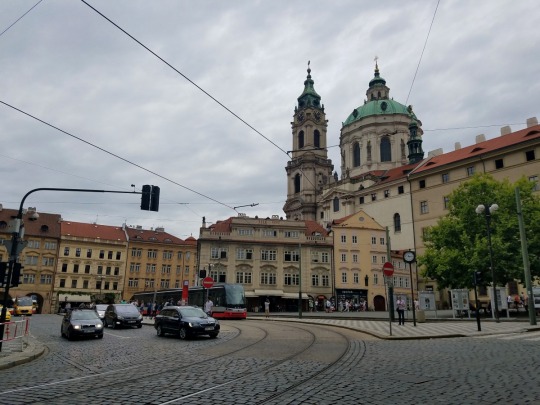
The metro doesn't go all the way to the castle, but that gave us a chance to enjoy a picturesque, if largely uphill, walk through the beautiful, shop-lined streets of the Castle District.
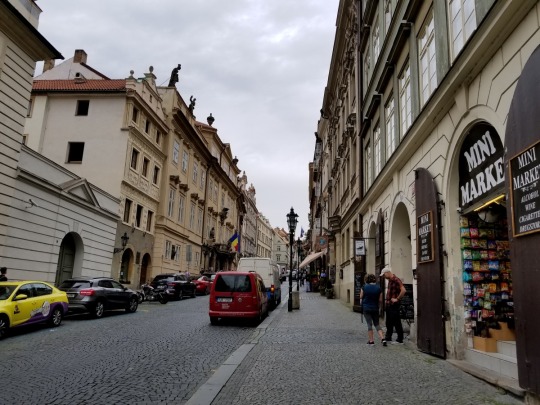
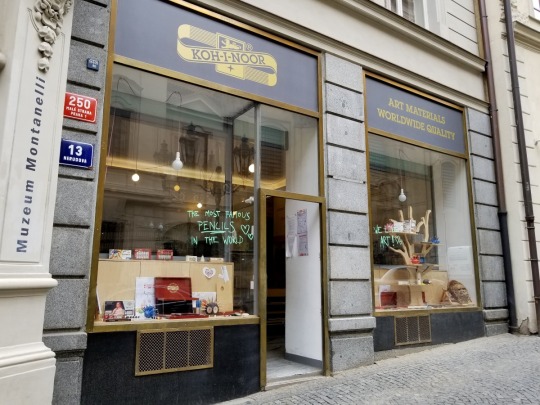
One of the shops was a Koh-i-Noor Hardtmuth--a major Czech pen, pencil, and art supply manufacturer. As a professional stationery fan, I had to go in.
Meanwhile, Jessica entertained her own professional curiosity at a nearby gingerbread museum.

There were also a lot of shops selling puppets and marionettes. The Czech people apparently have a rich history of puppetry dating back to the middle ages.
That doesn't necessarily make them less creepy, though.

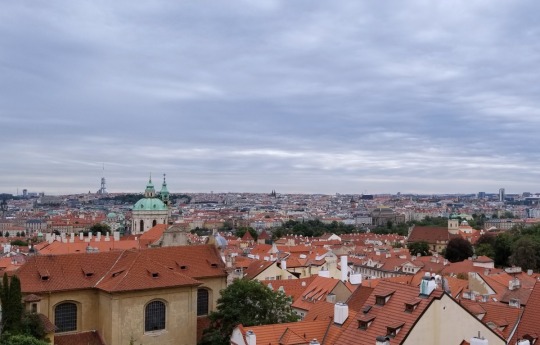
Once we made it to the top of the hill, we had a great view of central Prague. As well the surprisingly close Eiffel Tower.
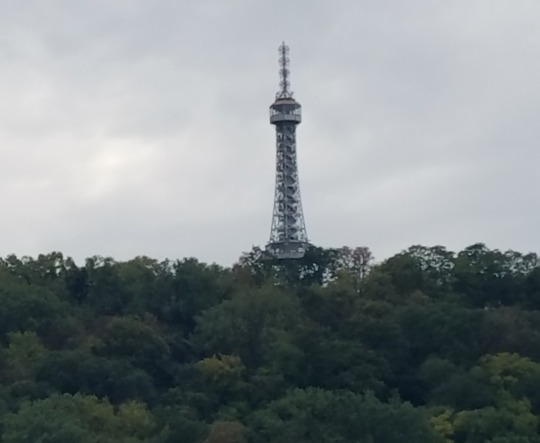
(It's actually the Petrin Lookout Tower, but it was directly inspired by the Eiffel Tower.)
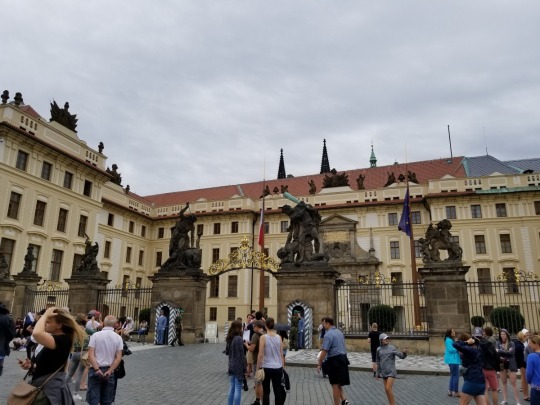
Prague Castle has been an important center of power for centuries--first for the medieval Bohemian kingdoms and later for the Austrian Habsburg empire that eventually absorbed them. It was also the home of the first president of Czechoslovakia after the country gained its independence in 1918.
It's also huge--a sprawling complex of palaces, churches, and squares. By some measures, at least, it is the largest castle on earth.
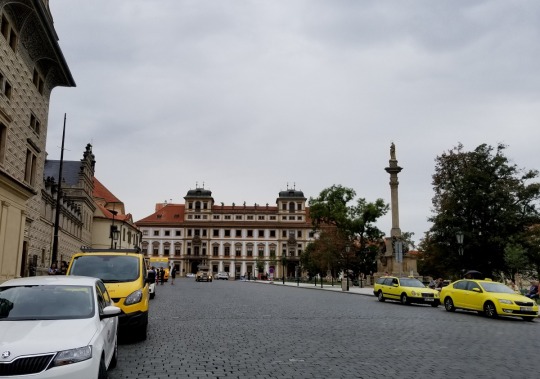
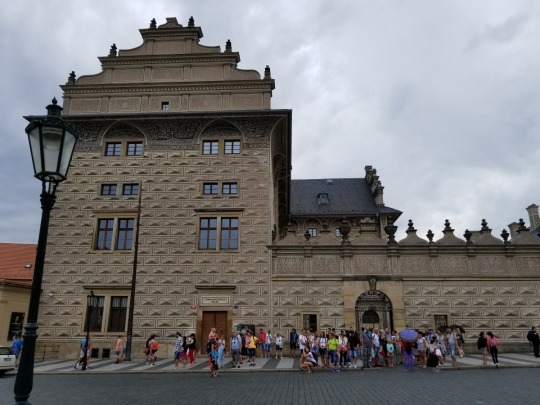
Outside the main castle complex is the Castle Square, lined with former palaces of important noble Czech families. One is still occupied by the Archbishop of Prague. Many of the buildings are painted with an interesting "envelope" pattern that gives the smooth plaster walls the appearance of being made of geometrically carved stones.
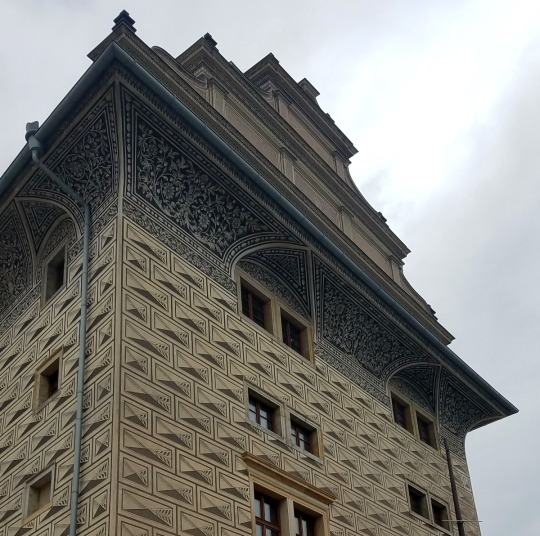

In the center of the square stands an elaborate column erected as thanks to God and Mary for ending a plague. It seems innocuous enough, but it is actually stands as a reminder of Prague's subservience to Habsburg Austria, which was were the tradition of erecting these Marian plague columns came from. After Czechoslovakia gained its independence in 1918, a similar column in the Old Town Square was torn down by a celebrating mob.
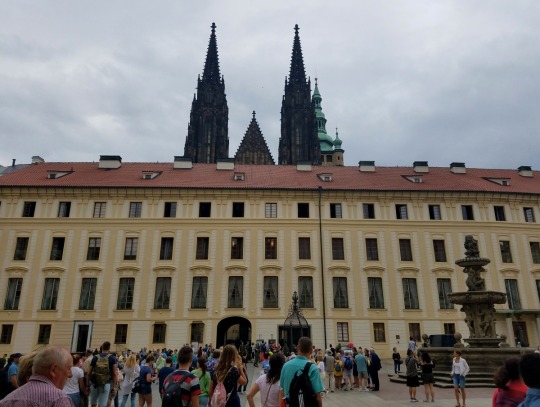
The castle grounds are free to enter as long as you don’t mind going through a security checkpoint. Once inside, you can buy tickets that cover various “routes” or sets of sights. When we got in, there was a huge line at the first outdoor ticket vendor. But the second ticket vendor, just inside a nearby building, had almost no one in line at all. Besides us.
(Thanks for the tip, Rick Steves!)
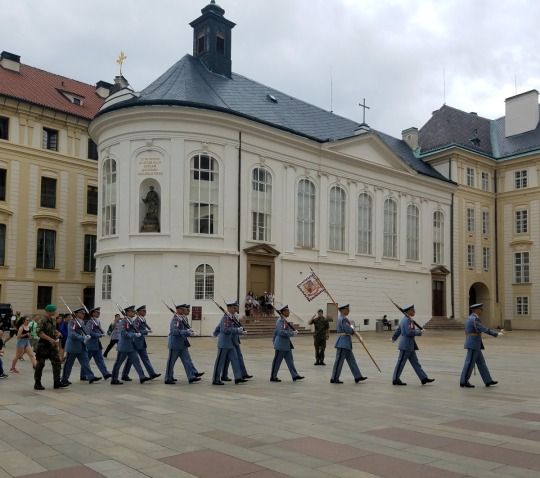
Just as we entered the middle courtyard, we got to see the changing of the guard.

The centerpiece of the castle complex is St. Vitus cathedral. It is big and impressive like a national cathedral should be, and was also one of the slowest cathedrals to ever be built. It was started in 1344, and due to wars, plagues, and religious reformations, it wasn’t completed until 1929. You can see modern architects with business suits carved into the western facade–representing the men who made the final push to get the cathedral finished in honor of Czechoslovakia’s independence following WWI.

Besides its massive size, beautiful Gothic architecture, and everything else we’ve seen in so many other cathedrals by now, one of the coolest features to us was a stained glass window designed by–you guessed it–Alfons Mucha.

The center panes show a young St. Wenceslas being taught Christianity by his grandmother, St. Ludmila. The two young women at the bottom of the window represent the Czechs and Slovaks. And the sides tell the story of Saints Cyril and Methodius, two brothers who brought Christianity to the Slavic lands from Greece.
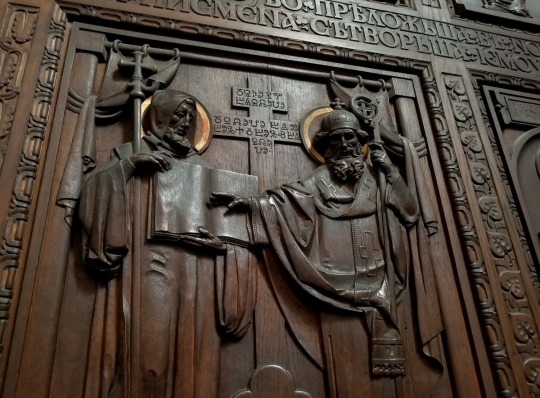
One of the brothers’ biggest problems in spreading Christianity was that the Slavs had no written alphabet. So Cyril, the younger brother, decided to invent one for them. Over the next few generations, that alphabet evolved into the modern Cyrillic alphabet, which is still used today in many Eastern European languages.
Sadly, the brothers’ lives didn’t go so well after that. When they returned to Rome to show the pope their new Cyrillic Bible, Cyril got sick and passed away. Methodius returned to Bohemia as an anointed bishop, but eventually a new pope came along and decided that the Cyrillic Bible was actually heretical. The church arrested Methodius and locked him away for years. He was eventually released, after which he spent the rest of his life quietly in a monastery.
So, if Wenceslas, Cyril, and Methodius are the three most-venerated Saints in Prague, why is the church named for St. Vitus, a 4th-century Sicilian boy who was boiled alive in tar?
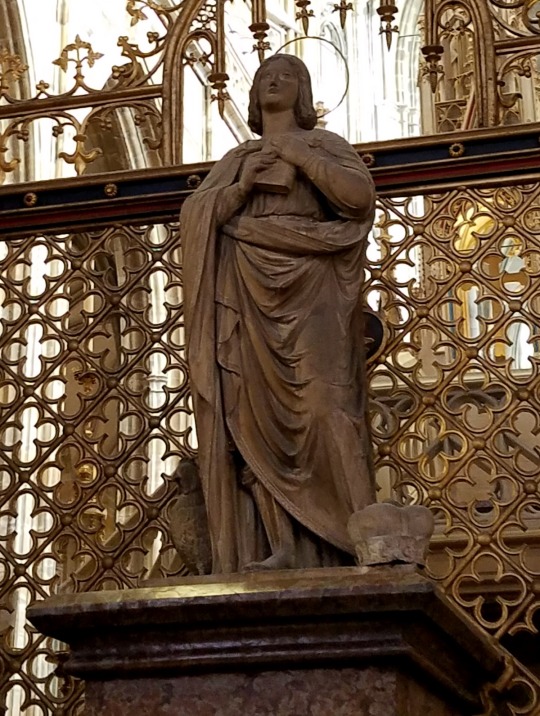
(The legend holds that a rooster was thrown into the vat of tar with Vitus as a sacrifice to the Roman gods, so Vitus is often depicted with a rooster at his feet. The legend also holds that Vitus was miraculously saved from the boiling tar. But not healed, so he still died--just later.)
In 925 AD, Duke Wenceslas--a Christian ruler of the still largely pagan Bohemia--received a relic of St. Vitus as a gift from the king of Germany. Wenceslas built St. Vitus Cathedral to house the relic, and it became an epicenter of Christianity in Bohemia.
It may have helped that the Slavic pronunciation of Vitus's name sounded a lot like the name of a pagan Slavic god.
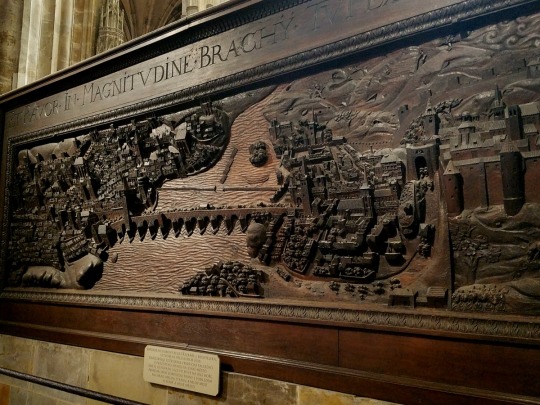
Other cool sights in the cathedral included a 400-year-old carving of the city of Prague as it stood in the early 1600s, as well as a massive silver tomb dedicated to another local saint: St. John of Nepomuk. John was a Bohemian priest who was murdered by King Wenceslas IV in 1396. The actual reason was most likely a disagreement over the appointment of a Benedictine abbot, but according to legend it was because John refused to divulge to the king what the queen had said to John during confession.
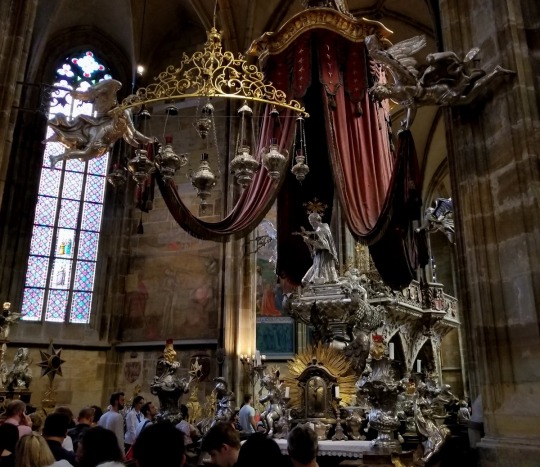
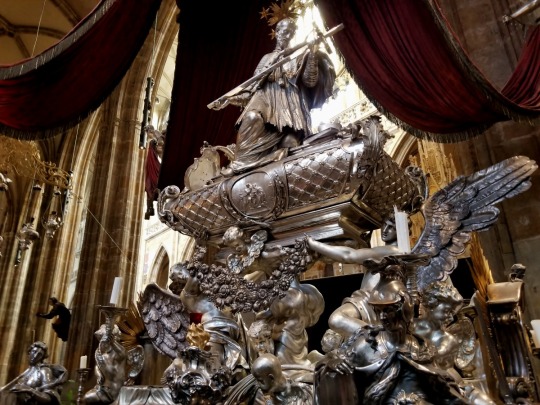
In any case, the tomb is staggeringly opulent. A huge crowd was gathered in front of it, and it was actually getting hard to move as we approached. Jessica was hit with a wave of claustrophobia and made her way through as quickly as she could, but I managed to stay behind a bit longer to get a good look.
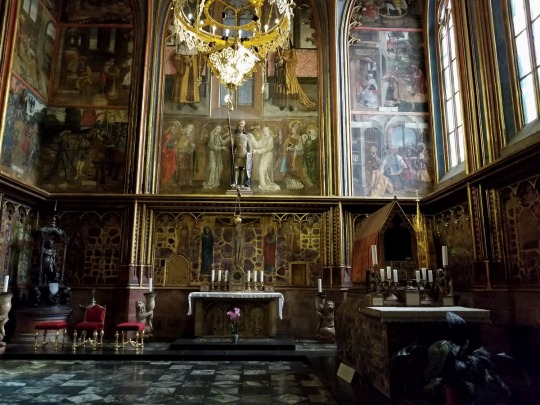
I also managed to get a peek into the gorgeous (and strictly cordoned) Chapel of St. Wenceslas, where the saint himself is entombed.
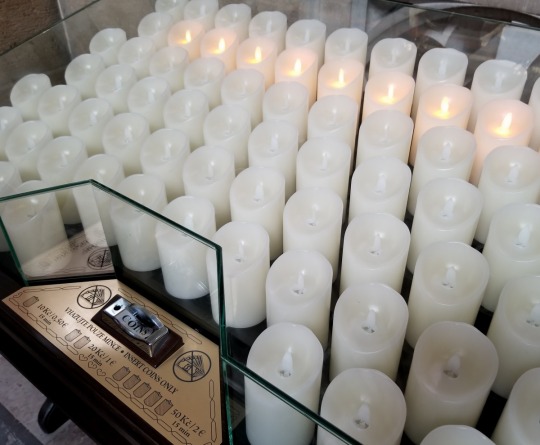
On our way out of the cathedral, we stopped for a moment to ponder the theological and economic implications of coin-operated electric votive candles.
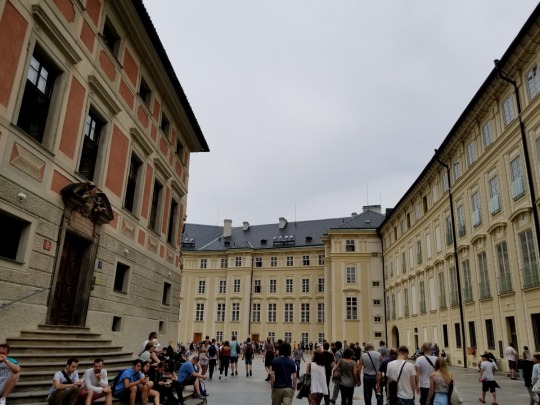
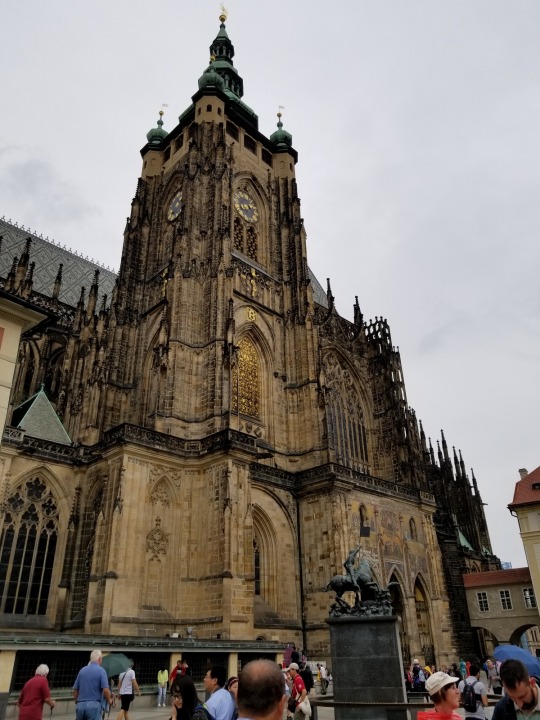

Back outside, we walked around the central courtyard to find the cathedral's spectacularly gilt south façade.
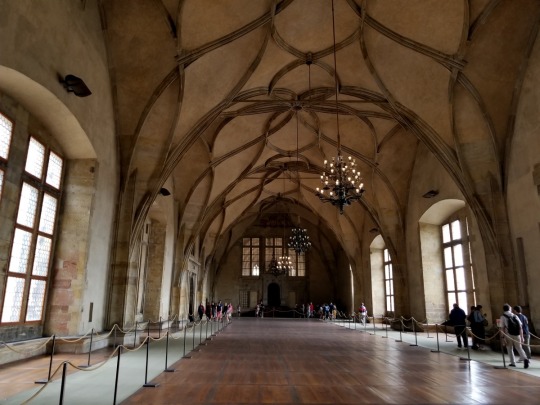
The next stop on the castle tour was the old royal palace. It was mostly empty, centered around a massive great hall that was once used for feasts, markets, and even jousting tournaments. Today, the palace holds the country's modest crown jewels, a throne room, and a room covered in painted coats of arms.
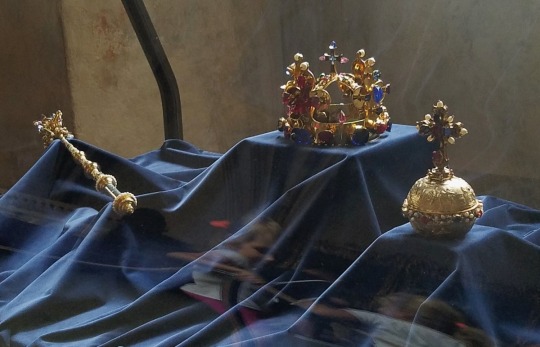
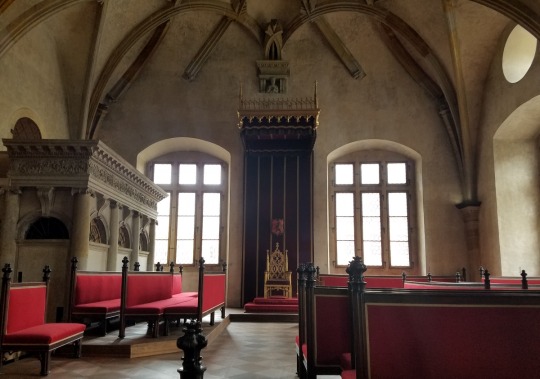
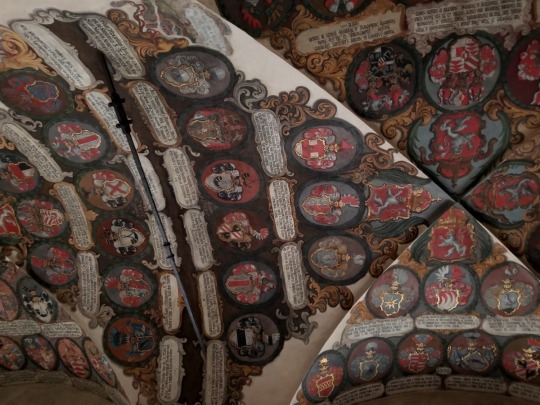
But the most important thing in the palace is a window. A window that helped spark the one of the bloodiest conflicts in all of European history--the Thirty Years’ War.
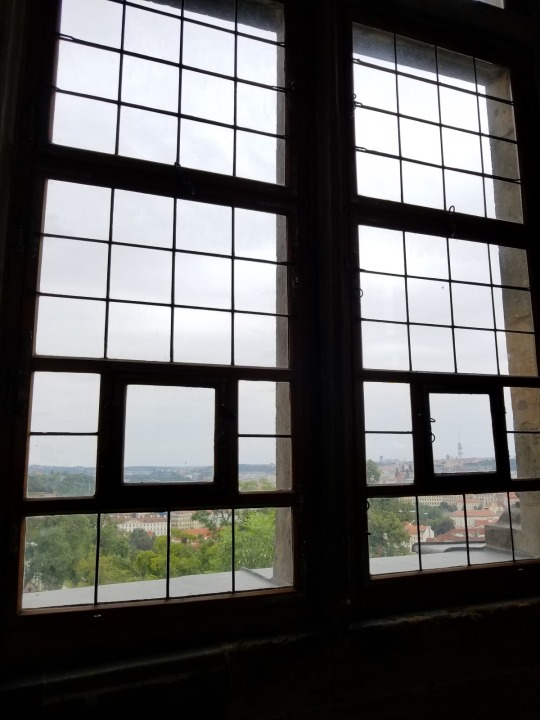
One of the few things I still remember from my high-school European History class is the Defenestration of Prague. Mostly because it taught me the word "defenestration."
Defenestration: (Noun) The act of throwing someone out of a window.
To me and all the other kids in the class, that was fantastic. In reality, of course, it was deadly serious.
Long story short: It is 1618. Under the terms of the Augsburg Settlement, rulers within the Holy Roman Empire could choose whether their state would be Protestant or Catholic. Bohemia is an Imperial state, and its rulers are Catholic. But much of Bohemia's nobility is Protestant, and they're tired of being ruled by Catholics.
So, following in the tradition of the Hussites 200 years earlier, the nobles go to Prague Castle and throw the Catholic rulers out of a window. One thing leads to another, alliances are invoked, opportunists join the fray, and soon all of Europe is embroiled in a brutal, convoluted war that kills millions--mostly German civilians caught in the middle.
In the hardest-hit German states, over half the pre-war population die by violence, plague, or starvation before the war ends.
The Peace of Westphalia--a series of treaties that finally ended the Thirty Years’ War in (appropriately) 1648--is seen by many as the beginning of the age of sovereign nation-states.
It’s kind of crazy to me that the idea of countries being independent entities with precisely defined borders and their own separate governments is only four or five hundred years old. But it’s true. Throughout the Middle Ages, Europe was more like a chessboard, with squares constantly being traded back and forth into increasingly large and convoluted hierarchies. A single marriage could join two countries together, and a single death could tear them apart again. One man could be the king of England, an heir to the throne of France, and also the descendant of a French duke. Does that make England part of France or France part of England? It took five generations of war to decided that the answer was “neither.”
You can’t really understand medieval and early-modern politics without adopting a much more fluid sense of what a country actually is. It’s still really hard for me to do, and I’ve spent a lot of time trying.
Anyway...
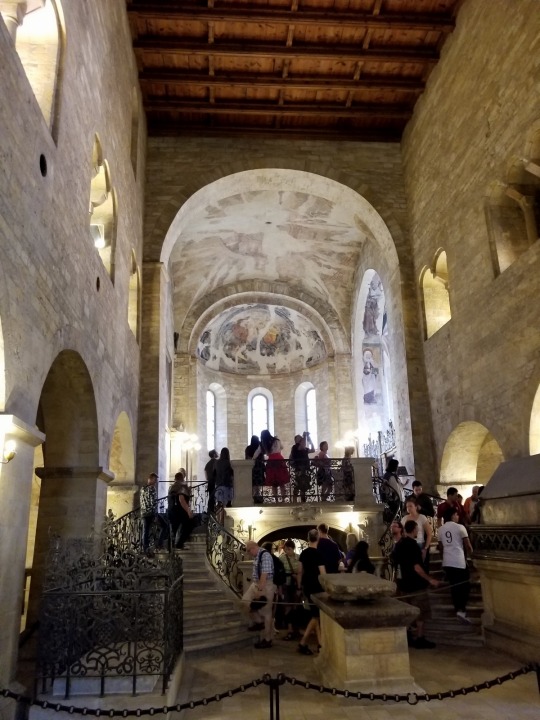
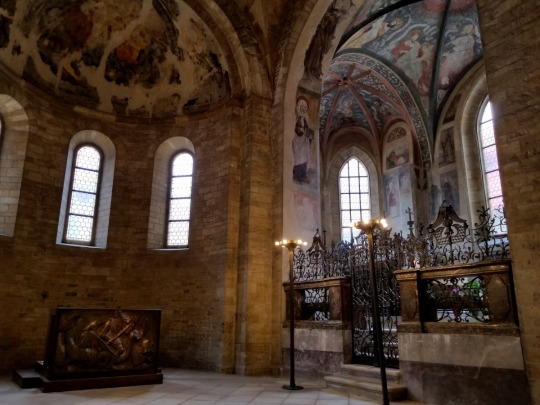
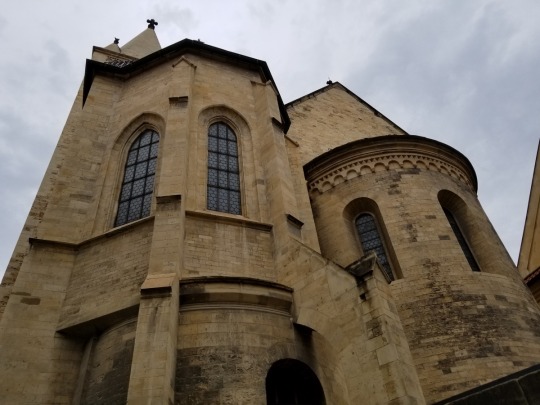
After the royal palace, we visited the Basilica of St. George--an old Romanesque church that served as the royal chapel before the construction of St. Vitus Cathedral. It is smaller, less crowded, and more intimate than St. Vitus. Among the old Czech rulers buried there is St. Ludmilla, St. Wenceslas's grandmother and the first Christian ruler of Bohemia along with her husband Bořivoj.
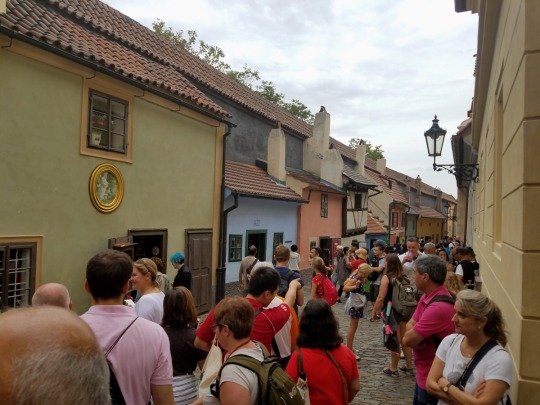
Our tickets gave us access to one more sight as we left the castle: a medieval shop-lined street called Golden Lane. The name comes from the goldsmiths who used to work their and serve the castle's opulent needs, but today it houses a wider variety of shops and museums. There were jewelry shops, of course, and a puppet shop that creeped Jessica right out.

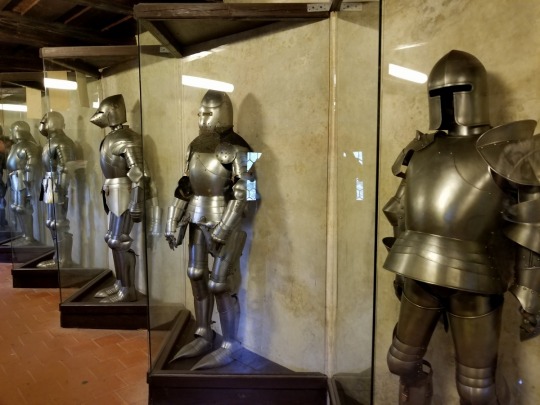
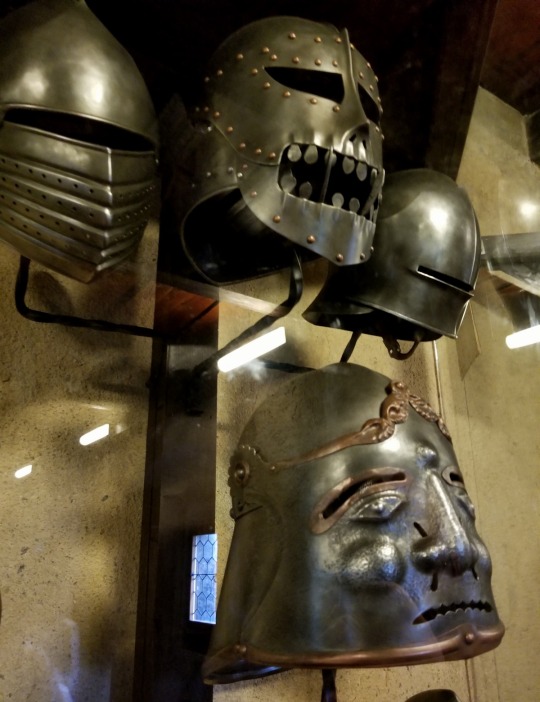
The coolest part for me was a showcase of medieval arms and armor, which was housed in the long attic that ran across the length of the street. Jessica found it immediately claustrophobia-inducing, so I stayed back to take pictures while she went on to look at the other shops along the lane.
Having made it from one end of the castle to the other, it was time for us to decide what to do next. There was the highly recommended Lobkowicz Palace--home to the oldest and largest private art collection in the Czech Republic--but Jessica and I had been around enough at this point to know that we didn't have another museum visit left in us that day.
The option we had in mind was a visit to the monastic brewery of Pivovar Strahov. It may have been considerably cooler than the previous days, but we had still worked up a strong thirst walking around the castle. Some traditionally brewed beer from a 17th-century monastery sounded like just the right way to cap off our stay in Prague.
Of course, that meant turning around and walking all the way back up through Prague Castle and another half-mile uphill beyond. It was worth it, though.
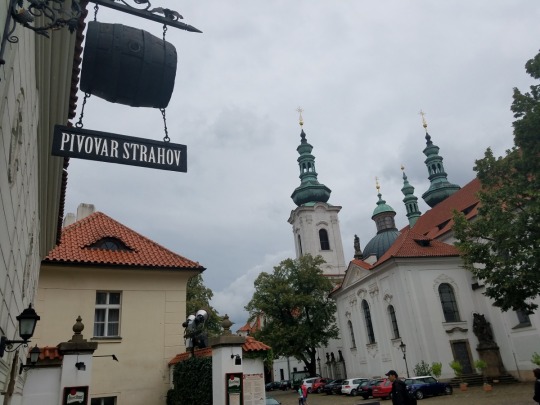
I'd wanted to try their "most award-winning" dark lager, but sadly it was sold out. So instead, I opted for their mainstay amber lager. Jessica chose from the more adventurous seasonal menu a coconut wet-hop ale.
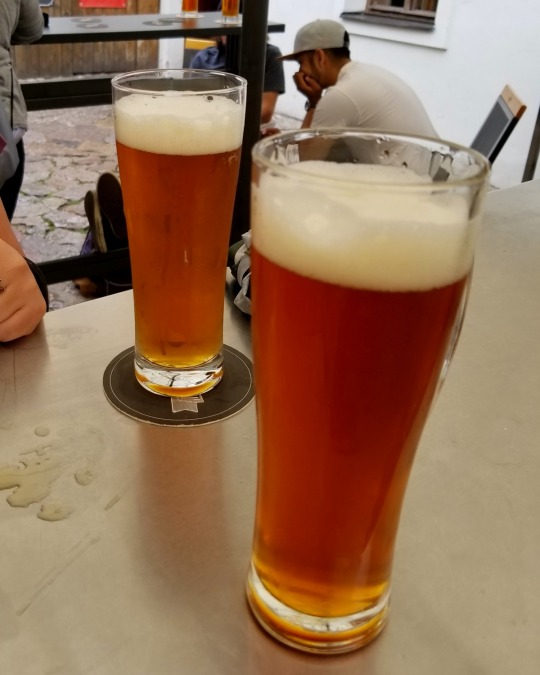
Both were good, but we each preferred our own choice.
Thoroughly spent, we called an Uber to take us back to our flat. Jessica tried to make small talk with the driver, but he cut her off with a cursing tirade against an aggressive cyclist on the road. Typical Slavic conversation atmosphere.
Overall, Prague was one of our most challenging cities, but it also left us wanting more. Even five perfect days would not have been enough, and with so much heat and so little sleep, we had been at a significant handicap. So instead of pushing ourselves to see one last thing, we contented ourselves to an early evening and an eager desire to return--preferably during spring.
Next Post: To Vienna
Last Post: The Slave Epic (and a Break for Beer)
5 notes
·
View notes
Text

Carlyle Stewart, MDiv ’20
“I know that the people in that church are praying for me all the time—even when I was sick and lost and messing up, doing dumb stuff, there was somebody praying for me. I think, to be able to dedicate my life to those people, there is no greater honor than that.”
Carlyle Stewart, MDiv ’20, is working toward becoming a minister in the United Church of Christ.
P.K.
I was born in Detroit and I spent my formative years there. My dad’s a pastor, so I’m a P.K. (preacher’s kid). A big part of my life was spent in the church, the United Methodist Church, which has about 4,000-5,000 people. It was interesting growing up in that environment because I went to a very secular school and spent a lot of time in secular spaces, but I also had my church community. I wasn’t a rebellious kid, but I was very turned off by church and religion because it was so present. Nothing was ever forced on me, but being a P.K. in that setting feels very limiting because there are a lot of labels and expectations put on you. I would say that I was really fortunate to be raised in an environment where I had the opportunity to ask questions and to really figure out what it is that I believe. My father was a big part of my development because he allowed me the space to come into my own.
I went to a private high school outside of the city, which was an adjustment, but I think it was good for me. It disciplined me and it taught me how to take school seriously. My senior year, I was awarded full Army ROTC scholarship to go to University of Michigan. So I did ROTC for a few years and I was in the process of training with the military with hopes of becoming a combat and infantry officer, which was an interesting experience. I enjoyed the discipline and the life of the military, but I was always pushing up against the structure and bureaucracy of it, recognizing that the military is not a place where’s you’ll thrive if you’re a free thinker.
In the beginning of the third year of the ROTC program you have to sign a contract and that is the concrete commitment to that path for a set number of years. If you drop out of college after that, or flunk out, then you are enlisted. When it came down to it, the day I was supposed to sign the contract, I just didn’t show up. I had a crisis of conscience—I thought there was something telling me not to do it. I think I had a small awakening where I thought that if I were an infantry officer or combat officer in the U.S. military then I would probably be asked to do things that I wouldn’t feel comfortable doing. I never wanted to put myself in a position to jeopardize my own freedom, and I recognized that I wouldn’t be able to make decisions that needed to be made. I also needed to be real with myself and say, “I don’t think I’m the type of person who would thrive in this environment, and I don’t know if it would be good for the military or for myself, so maybe I should save them the trouble.” So I ended up not signing the contract, and I had to pay a lot of the money back from the scholarship.
After that I was kind of floating around and didn’t really know what I wanted to do, because I had been so committed to the ROTC plan for three years. I ended up majoring in psychology in undergrad. I also took a lot of philosophy courses. I took a class on the cognitive science of religious thought. This was during a period of time when I wasn’t going to church. I had completely abandoned the church, and when I went home I refused to go. My family obviously felt some type of way about that, but they let me do what I needed to do.
That class kinda blew my mind and uprooted my world because I thought, “Wow, this whole religion thing is fascinating.” It made me do a lot of my own research about faith, religion, existentialism, and secular humanist thought. Approaching my junior and senior year I was still really skeptical of faith and religious institutions in general. I went through a pretty tough time spiritually. I was lost, and I didn’t really have any grounding. I recognized by taking that class that I thought the whole faith conversation was interesting, but I wasn’t really courageous enough to really delve deeper into it, and all the time I’m forgetting about my roots and where I came from. I was just actively pushing up against it the entire time.
After I graduated, I worked for a year. I ended up taking an extended trip to Alaska, which was life changing and transformative. I got to this point where I had this insight that started to come to me about God and faith and that’s when I started looking at divinity school. I thought I wanted to go to div school, but not so that I would be a minister or a pastor. I just wanted to study religion academically. I was going back, mentally, to growing up in the church saying “I want nothing to do with it, I don’t want to be a pastor.” Every man in my family for the last five generations has been a pastor, so I thought that was the last thing I wanted to do.
Who We Are / Where We Come From
I came to HDS thinking I wanted to be a professor. When I got here, my first week into a philosophy course I was taking, I realized: “I don’t want to do this.” I couldn’t see myself as a professor. Not because I don’t value the type of work that they do—I love the intellectual work of theorizing, studying, researching, connecting things—but I needed to root it in the real world, to bring it back to my community, to the people who are dealing with these theological questions on a daily basis.
Then I worked on a research project in my second semester on African Spiritual Traditions in Yoruba spirituality. The project was about ancestors, and the importance of recognizing who we are and where we come from. In these traditional religious traditions, ancestors play a huge role. Around that time, I was thinking a lot about my pops, and my grandfather and great-great grandfather and the people in my family. And I started thinking, “Am I struggling with the call to ministry, is this why I’ve been lost for so long? Should I be a minister?” It took me a long time to think that through and mentally and spiritually I was in a really low place. Saint Ignatius called it a place of “spiritual desolation.” I had no idea what I was doing, and I was searching for something but I didn’t know what it was. I came to those short moments where I thought: “you know what, I’m just gonna go with this whole ministry thing.”
I ended up switching my degree to the master of divinity and heading down the pastoral ministry track, and it wasn’t until then that this overwhelming sense of peace came over me. I feel like now, I found what I’m supposed to do, even though before I didn’t want to do it. It’s funny how sometimes the things that we don’t want to do end up being the things that we are the best at. I think I had to stray away from it and to figure out who I am and what I believe in order to come back to it without it being forced upon me. I am thankful.
It wasn’t until I started preaching and working with the congregation here and back in Detroit that I recognized that this call is real. I spent a lot of time praying and meditating about it to make sure it was authentic because I thought, “who am I to be ‘called to ministry?’” It’s a sacred task that I don’t think should be entered into lightly. I was really confused and wondering why I felt compelled to do this when I don’t have the skills or life experience yet. There’s a lot of things that I don’t know. But I think it comes back to having faith and recognizing that despite the doubts and uncertainty you just gotta keep walking even if you don’t know where you’re going. When I started preaching and doing ministry work, it felt like where I finally wanted to be. I’d never felt this before. It really gave me a sense of purpose and direction, and my faith has strengthened probably a hundred-fold since I’ve been here.
Making Meaning
What they call it is theological reflection—thinking about what things mean to you within the context of our own faith and beliefs and the traditions that we come from—how do we make meaning? Sometimes I look up and I’m like, “I’m at Harvard University, how did I get here? What did I do to deserve to be here when so many people I know didn’t even get to go to college or barely even graduated high school?” Part of me feels incredibly blessed to be in a place like this, but I also feel a huge weight on my shoulders not to take this education or opportunity to gratify or edify myself for granted, but to take something and be productive and bring the knowledge and skills back to my community to help the people who need it.
I preached on my dad’s birthday this year, which was a surprise we planned for him. It was probably the best day of my life because of the sense of inspiration, revelation, insight, fulfillment, the peace and purpose that I felt. All these words embodied what this experience was for me. After doing that, I almost had this vision where I was like, “Okay, this is what I’m supposed to do with my life.” And it was so clear. It was an intuitive sense that I had. When I started to feel that, I thought that it made sense that I had felt before like I had to go away and be forced to come back maybe by God, it seemed like he was telling me: “Look, you want to do what you want to do, but you’re about to do what I need you to do.” When I really started to come deeper into my faith, I started to rely more on prayer, and it wasn’t until I started doing that, that I was able to clearly listen.
Returning
Going back to that church at home and experiencing the love that people showed me and the appreciation that people gave me was immense. When I looked into the eyes of some of the people after preaching, I felt that these were my people. They have supported my dad and the church, they’ve been there since I was born. After preaching that day, and seeing what it did for people and what it did for me, and recognizing that it was only by the grace of God that I was able to stand up there and say what I said and really connect with people, I thought, “This has nothing to do with me, it’s all God.” Now I know that it’s only by the grace of God that I’m here at Harvard, that I was able to give that sermon, that I’m even alive, that I’m healthy, that I’m where I’m at in my life. I feel like it’s my duty and responsibility to dedicate my life to service of God and God’s people. I feel like I wouldn’t be alive if there wasn’t somebody praying for me. And I know that the people in that church are praying for me all the time, even when I was sick and lost and messing up, doing dumb stuff, there was somebody praying for me. I think, to be able to dedicate my life to those people, there is no greater honor than that. There’s nothing better than that.
I think that before, I was so preoccupied with doing things that haven’t been done before. But now I recognize that, while you may walk a traditional path, that doesn’t mean that you have to do it in exactly the same way that somebody else has. I truly believe that we all have some sort of purpose or something we’re supposed to be doing. I could live my life for myself, I could seek to accumulate wealth, fame, recognition, but at the end of the day, you can’t take any of that with you. In my personal belief, the only thing you can take with you is your relationships and the way you treated people. I think that’s the stuff that lives in eternity: how we love people while we are here. When we forget that there is a purpose that we should be striving to find, that’s when we fall into the depths of despair and of meaninglessness. I think that we find that purpose by coming into faith in God. And I think it is beyond religion, it has to do with faith in something greater than ourselves. It’s not until we come into that faith that we start to see that purpose and life makes more sense. Living becomes easier, it becomes clearer, and I think happiness resides in that realm, too. For the first time in my life, after really discovering this, I feel truly happy and joyful and like I have peace.
Rising Up
At the end of the day, even though people may have their frustrations with the School, I think the beautiful thing about HDS is that you get here, and they just throw you into it, and they’re like, “Do your thing.” Nobody’s going to force you to believe anything or force any doctrine or faith tradition down your throat. You have to find out who you are and why you’re here. I’m one of the people who had to search. Once I found it, it became easier to be here, it became less of a confusing and alienating place to be. Everything got better.
I also recognize that if I were in a place that were more firmly rooted in a particular faith tradition, I may not have realized what I did. By being in a more secular institution that’s predicated on the academic study of religion and not necessarily forming ministers, I was forced to recognize that I don’t want to be like that. I was forced to figure out who I was and what I wanted. I think if I were in a place that handed me everything then I wouldn’t have had that experience. I feel blessed and thankful to have had all these things happen.
Right now, I’m working on the process of ordination at the United Church of Christ. In the UCC, in order to be ordained you have to have a call, like a specific offer from a congregation. So I don’t know if I should go home and be with my home congregation or look for somewhere new. I think it’s going to require a lot of reflection. I know it’s all part of my development, though, so I’m just gonna roll with it.
Interview and photos by Anais Garvanian
#Harvard#Harvard Divinity School#Religion#ministry#church#Religious Studies#united church of christ#large
1 note
·
View note
Note
So uh....I know this might not be the easiest but how about that trip to hell via the gate??
i’m guessing you’re talking about nova and seraphim’s first mission!
step right up–this one’s a bit of a doozy. and decidedly lacking in the aesthetics i had in mind when i first started it and morphed into something wildly different… hopefully the disappointment is more of a dull ache and less of a shooting pain.
there are also depictions of body trauma and other violence below the cut. proceed with caution.

“lillith gave me a briefing on the way down here but uhm–run it by me one more time.”
seraphim grinned, slipping on her forearm guard. she began, reaching up to adjust the goggles over nova’s eyes, “this particular part of the underworld is, to us, gate point seveny-nine point three. it’s not a part of our hell, per se, but it’s–look, it’s close, hit me up on a day off and i’ll explain the finer theological points. our job today!” seraphim pivoted on a heel, grabbing her bottle of body armor and swallowing the last of it with a backwards tilt of her head, “is to go free the prince. name’s kreuger. not a bad–uhh. well he’s not as bad as who’s overthrown him.”
nova swallowed, shifting. the armor was heavier than she anticipated, but lighter, all at once. not something she’d worn before on any previous run. it was a blood-rust red, matte finished, and was more streamlined than bulky. she figured it was because they’d have to be stealthy. move quickly. move unseen. the only thing heavier were the pistols that hung on their hips,fueled by a cell pack that gave off a faint green glow.
she also remembered drake and wyvern positively beaming the day before over the tech that currently cloaked their frames. “the place you’re headed’s not exactly human-friendly. think the mojave with a little more punch and a lot more poison. this–” wyvern tapped on the outer shell. “–will protect your skin, help regulate your temperatures so you don’t get overheated.”
“and this,” drake took the liberty of lifting a mask to his face, “will help you breathe. we’ve got goggles to match for eye safety ‘cause gettin’ ocular degeneration over a period of ten minutes once you get back is a mega bummer.”
“don’t you mean macular?”
“nah, this shit’s a lot worse, we gave it a new name.”
“oh.”
but seraphim’s gentle touch on her elbow brought her back. “it’s okay to still be nervous. from what i’ve heard, every time feels like the first time for the few couple of months that you’re jumping. but you’re with me, and lillith wouldn’t send me in with a rookie if she didn’t think you could handle it, which means i already think you’re a badass. we just have to work together, okay?”
nova smiled at the other agent’s earnest expression. she couldn’t help it.
this was an adventure that she’d been wishing for, for a long time.
“let’s go take ass and kick names. … wait.”
“close enough!” seraphim laughed as they walked towards the gate, glowing a faint blue around the outer rings. someone had put down stage tape at their mark. it clashed with the long, red rug that rolled out beneath the gate to the doorway.
“final safety check, equipment secure?” nova noticed wyvern’s voice had dropped a pitch. maybe this was his proper officer tone. she pushed down on her mask, her goggles, taking deep, deep breaths.
“equipment secure,” she answered him, turning back to meet his eyes at the console at the other end of the room.
“copy. initiating travel sequence. please remain still.”
(”dude we’re not talking over radio, do you still have to say ‘copy’?” “drake shut up!”)
and it sparked. that was the best way nova could think to describe it, even now. like seeing a heart pulsed back from the dead. then the tendrils of white light that branched out from the inner ring, like tentacles looking for each other, right up until they snapped forward, wrapping around the two of them. their feet remained rooted to the floor as they were surrounded by light, and then eventually, lifted.
everything was perfectly silently. that was the barrier building. all of the tethers tying them to their home timeline being carefully snipped, so they could be pulled in. nova glanced at seraphim, who just gave her a swift thumbs up, before there was a violent snap; to drake and wyvern: they were just gone.
but nova and seraphim landed roughly on their feet on rock that looked a bit too much like freeze-dried… well. nova picked her eyes up as soon as she could. didn’t want to look at it. her stomach caught. deep breaths, deep breaths, you’re fine, you’re fine…
but seraphim was hunched over, her breathing sort of staggered, just like hers was. “jeremy, do you have our signal?” her voice was a little weak, hoarse. a little muffled because of the mask. “… good. we’ll signal when we’re ready to be brought back. copy. … and remember to record the thunder game while i’m gone, i think we play los angeles or something. copy for real this time… hey, see, you made it!”
nova just stretched out an arm, which seraphim took, helping her take a few adjustment steps forward. and as nova walked, she was able to take in the landscape that surrounded them–and that seraphim’s gait was a bit stilted.
wasteland. that was the first thing she thought of. a sky the color of a rotted bone. mountains in the distance that weren’t wounded-colored but rather more like aged, rotted wood, jutting up from the cracked, jagged ground. something was coming down from the sky like a faint, soft snow. it was grey. and definitely wasn’t snow.
beyond everything was a faint red glow. like they were standing in a volcano’s mouth, and the rim was wide, wide around them.
“have you been here before?” nova asked, her tone hushed. the space here was oppressive, closing in, heavy. sort of like a sauna set too high, even with the armor. there was a beat before seraphim answered her.
“… a few times. i wouldn’t say i’ve been through the gate often, but i’ve been often enough to know that i really dislike being brought to places like this, and enough to know i really want us to go to gate point nintey-three point one after this. it’s a wonderful kingdom, el. haven’t been in a while. hope the princess is all right, she said something about a man named ganon before i left last...” her voice seemed to trail off for a second, before she coughed, shaking her head. “not sure why lillith keeps bringing me here. i’m not a prime candidate for jumping. … not like you.”
“not like me?”
the goggles were so reflective that all nova could see when she looked at seraphim’s face was either mask or a reflection of an alien horizon. an unholy horizon. “i may or may not have looked over your file before this. you have… i can’t remember the specific words they used. but you have something in you that makes you an absolute fit for this role. i’d called it god-crafted. a gift from the spirit. other people would call it other shit. but i said what i said.” seraphim nodded, like she was adding emphasis, before turning her face to look at the landscape. “okay. they sealed kreuger underneath the end of the palace–”
“the palace? hell has palaces?”
“my sweet little chicken nugget, all underworlds have more than we’ve been told. and to answer that question, yes. like… c’mere, look, look…” seraphim beckoned her over to a ragged cliff, which overlooked a valley that seemed to stretch on for eternity.
it was like a cradle full of darkness. the only light that existed seemed to be that of fires, torches. candles.
and in the center rose up something that towered over everything, something that–reminded her a lot of maleficent’s castle from sleeping beauty. weird.
“that’s where we need to go. if i remember from the last time i was here, i know a shortcut we can take, we just have to stay low and stick together. you good? … awesome. follow me. keep your eyes peeled. we don’t want to fire unless we absolutely have to, it’ll draw attention to us that, trust me, nobody will want.
“
* * *
it still took them hours to reach the palace. hiking through the worst kind of desert, dodging rogue demonic entities, hiding. seraphim discovered that their armor had built-in cloaking (”were you going to fucking brief us on this or did you just forget?” “… uhm.”) which made it infinitely easier.
it took nova–well, to be fair, she still hadn’t quite gotten over how they all looked. and none of them were the same. each demon was fairly humanoid in shape… except for when they weren’t. and each one had viscera showing where a body part was missing… except when they didn’t, and then proceeded to have way too many eyes or mouths or teeth than any being anywhere had the business of having. and the sounds they made when they walked. if she wasn’t going to ask cherub for something for her bath before…
“think dinosaur rules,” seraphim had whispered over her shoulder, crouched behind the corner of what nova thought looked a little like an adobe house (not even the ability to become invisible could quite break her out of sneaking behind everything). in fact a lot of the aesthetics of the city–could she call it a city?–reminded her a lot of taos, jemez springs. new mexico. “if they don’t see movement, they don’t see anything.”
“wait, didn’t someone disprove that?”
“lucky for us nobody told these assholes.”
as they snuck further and further into the heart of the metropolis, the aesthetics seem to… shift. from rustic adobe to more alhambra. if she could easily pick out things from her own world to compare all this too, then surely, it was tied to earth somehow, right? “uh, morgan…” nova began. she kept close to her side. the alleyway they were walking down was vacant. seraphim took the opportunity to stretch her neck, roll her shoulders.
“this place looks a lot like this catle in granada…”
“that’s because it–sort of is.”
and there was a bit of silence before: “… i’m guessing i should wait until we get back before i lay into you with questions about how the fuck that’s possible and what the hell that even means.”
“first bath, then a nap, and then i know this great brunch place not too far from the estate, i promise i’ll tell you everyt-!” her voice cut out abruptly and one of her arms shot out in front of nova, pressing her against a wall as something huge, hulking and smoking lurched in front of the opening of the alleyway. seraphim let out a long, shaky exhale.
“the only place worse than this is centralia…”
“where?”
“put it on our list of sleepover topics. it’s gonna be long. this place tends to do that. although it’s honestly not that hard to sneak through as long as you’re careful and you’ve got the right tech. you just gotta be smart.”
they both carefully started towards the end of the alley, sticking close to the wall. nova thought she could smell something… it wasn’t brimstone, not quite. but close. just as unpleasant. “speaking from experience?” it came out before she could stop it.
seraphim didn’t answer until they reached the end, motioning for nova to look upwards. the spire of the tallest tower looked a lot closer than it had an hour ago. they were getting close. “… yes. once. once is all it takes for you to learn. i had amy tattoo my left calf for a reason.”
* * *
it was only when they reached the actual outer wall separating the palace from the rest of the city did the vibe turn a bit more–gothic was an apt descriptor. the spanish vibes gave way to something more once upon a time, something more disney, and somehow it was worse than what they’d walked through. a glossy surface trying too hard to be romantic hiding something insidious underneath, like organs wrapped in plastic wrap.
there were vines of roses along the upper edge of the wall with thorns the length of nova’s palm.
seraphim stared up at the blossoms, “okay. climbing over the wall is a no-go. each of those packs enough poison to kill something three times our size. the front main gate in and out has about sixteen different layers of wards on it and as much as i love our basement boys, i don’t exactly trust their cloaking shields to withstand that this close to the throne room…” seraphim started taking one step, then another, eyes on the flowers, lost in thought.
and nova was, too, up until she remembered: “oh! wait, i have an idea.” she unclipped a small box the color of gunmetal from her belt over one of her back pockets. “i’ve been helping jeremy and joseph with this. we’ve had a few successful test runs, and i think now would be a good time to give it an actual field test.”
“well, shit, okay, you thought of an idea first so we’ll go with that. uh–what is it?”
and nova actually swayed a bit, like an excited child. “i’ll show you. but first, you have to tell me… if you could make a hole anywhere in the wall, where would be the best place?”
that was about the time that they heard shouting, too close to be comfortable. it was in a tongue deep, guttural, with a lot of clicking interspersed. “definitely not here. c’mon, i think i know just the spot.”
after about fifteen minutes of fast-paced creeping, seraphim stopped. nova could see the roof of something like a shack over the roses, which she no longer doubted were circling the entire place. “just on the other side of this wall is a part of the chambers for the staff. i’m positive that he’s under that, and that there’s gotta be a way down there. i don’t think they’d let him starve to death, he’s too useful alive.”
“awesome. okay, stand back, calibrating this is a bit tricky…” seraphim took a few wide strides backwards as nova tucked the nondescript box into the crook of her elbow, but quickly jumped when she realized the agent was doing so to remove her glove.
“ellie, wait, no no no–”
“i have to have skin-contact in order to activate it, i promise i’ll hurry. call it a sacrifice for the mission.”
as soon as the glove left her hand she very immediately realized that she wouldn’t have a choice. she’d been expecting a burning sensation, and that’s exactly what she got, but it still sort of took her breath away, for the first few seconds. it felt like something that you could almost get used to, if given enough time. almost. seraphim’s own covered hands went to the sides of her face. “oh jesus, okay, go do your thing sugar–”
with her thumb on the top of the box, and with her jaw clenched trying to fight through the persistent stinging, she traced a well-practiced pattern. for a moment, nothing happened. then from the end of the box shot out a circle of light, that landed on the wall in a perfect oval, like an outline.
“oh it’s so pre–”
seraphim didn’t get to finish. there was a sound like a large rubbing band being strung, almost like a bass guitar strum–and there was a perfectly cut hole in the wall.
nova was struggling to put her glove back on so she didn’t quite notice how seraphim had thrown her arms out and was just wildly gesturing to nova, to the wall, back to nova, back to the wall, “what the fuck. what the fuck. what the fuck. oh my god. that was awesome. holy shit. what the fuck did you just do. i just. oh my god. oh my god let’s go i have so many questions when we get back–oh. ellie, you all right?”
she was taking in breaths through her teeth, cradling her hand against her chest. “yeah. yeah. just feels like a really really re-he-eally bad sunburn.”
“well hang in there starkid, as soon as we find kreuger, he can take care of the rest himself. and ah, we won’t want to be here when that happens anyway. pray that nobody’s in here.” she brought up her pistol, “i know i said no firing, but–wait, was that your trigger hand?”
“uh–yeah.”
seraphim took the liberty of taking nova’s pistol of its holster and putting it in her uninjured hand. “as long as you don’t shoot me, this’ll probably work. probably. okay…” her voice lowered. “team break.”
* * *
lillith must have timed their jump on purpose, seraphim reasoned, or had some kind of premonition about how long it would’ve taken them to get to the castle, because right as she pushed open the shack door, there was a single, long gong from far above them. “what was that?” nova couldn’t get above a whisper.
“given that no one’s in here, i think it’s a feasting hour. all the help’s off serving that absolute fucking batshit son of a--” a huff. “we need to hurry and take advantage of this while we still can. the servants here are the only creatures i pity. … well. they’re at least on the top five.”
nova could see why. the room was rotting away in places, black, black, blacker, an absolute absence of color amidst what looked like concrete and wood. two sets of bunk beds, and the word ‘bed’ was generous. more like just four stone slabs large enough for an adult human attached at different heights to the wall. and that was all, except for a scrap of off-white fabric on the floor.
“but where do they go to the b–”
“trust me, you don’t want to know.” seraphim interrupted, peeling back the rug to reveal a trap door. she sighed, “i know this is the right way, but this seems too easy… you got us through the wall, i’ll be body insurance going downstairs, deal? cool.” she lifted the heavy door, grunting under the weight, revealing a very narrow stairwell that looked like it was carved out of brick. there was a dim light coming from somewhere they couldn’t see, just enough to make the stair landing visible. seraphim shook her hands, taking a deep breath. “here goes nothin’, wish me luck.”
she didn’t get very far.
seraphim put one leg out in space, aiming to awkwardly go down the steps, when her leg jerked hard to one side. she swore under her breath and grabbed nova’s arm, quickly pulling herself up to sit on the floor.
she had a needle roughly the same thickness as a knitting needle shoved through the top of her boot. blood was beginning to ooze from the wounds. “ohhhhkay. i don’t know what else i was expecting.”
“morgan–”
“this is fine.”
“morgan.”
“this is okay.”
“do we leave it in?”
seraphim swore again, this time with a little more enunciation. “no. i don’t know what this is made of and now it’s currently inside of me, so we’re just going to uhm–ellie you have to do it.”
“what?”
“ellie i can’t pull this out you have to do it, you gotta not hesitate and just go for it, i don’t have the g–FUCK.” nova wrapped a hand around one end of the needle and jerked it clean in the middle of seraphim’s rambling, replacing it as quickly as she could with her hands, adding pressure. there were a few moments where the only sound was seraphim’s ragged breathing, which eventually calmed, as she braced her foot against the opening to the basement. safe in nova’s hands. “… thank you.”
“don’t mention it… but what do we do now? is the entire area down there going to be like that?”
seraphim sighed. “probably. and we could stop and look for the way that the help disarms the hallway, or we could do it my way, which will take a lot less time…” she awkwardly shifted up into a squatting position on the floor, staring down into the dark. “and because we did the right thing and properly hydrated before the jump, i should be able to do this even with my gloves on… just gotta focus for a sec…”
seraphim took one huge breath in, and out. ignore the pain. ignore it. we’ll deal with it later.
she held her palm out flat, and then lifted it. as she did, spots all along what they could see of the lower level glowed a faint lavender shade.
nova’s eyes widened. were… were those all the traps that had been set?
seraphim raised her other hand, and tried to snap her fingers. no dice. she hissed, making an abrupt fist.
what followed was a soft cacophony of things breaking, falling, or shattering.
“morgan that was–oh!”
seraphim had yanked her mask down in time to vomit violently off to the side, rib cage moving erratically underneath her armor. it honestly didn’t make the room smell that much worse.
“are you–?”
“yeah, just uh–don’t ask me to do anything like that again for a few hours.”
“that was… amazing.”
seraphim threw her head back, laughing roughly. “yeah, we’re both pretty rad, now let’s–let’s go get this fucker so we can go home, i need to go to medical like yesterday.”
* * *
with the traps disabled, the going down was easy, and straightforward. they crunched over needles, arrows, and metallic shapes as they went. everything around them was like sod, with torches embedded in the walls.
nova tried not to think about that they looked like arms, eternally smoldering just bright enough to light the way.
“what, no labyrinth of endless twisting hallways? i’m a little disappointed.”
seraphim was trying to not limp but pain spread up her leg with every step she took. shit, shit, shit. she kept glancing to nova’s hand, hoping that she couldn’t see behind her goggles. “for one, they think that the traps will kill or maim anyone not authorized to be down here. for two, if they are authorized to be down here, why waste their time?” their voices were quiet. they hadn’t seen anyone else down here, but…
the torches stopped. and there was a long stretch of darkness before they came to another pair. nova grabbed a hold of seraphim’s arm, and she let her keep it there, up until they entered the rim of a dim glow by a wall of bars.
a cell.
“kreuger.” seraphim began, gently. “… kreuger.”
“hush–exorcist.” nova’s grip on seraphim tightened as he spoke. she had to twist back when she realized she’d almost buried her face in seraphim’s shoulder out of some kind of reflex. he sounded like… the buzzing of bees, the low growl of a monster, with a canyon beneath all of it. she hated it. “i hear you… who is this? this is not john.”
“no. it’s not. enoch has… left our little club, since we last saw each other.”
as seraphim spoke, voice laced with pain, kreuger stepped up to the light, although nova could see the backlight, inhuman reflection of his eyes before he got close to them. she wished he’d stayed away.
he did look human. almost. limbs a little too long, face a little too angular. his eyes were a solid pink, no pupils to speak of (where did the reflection come from, where did it come from?). he had horns, like a ram, that rose up and wrapped around his pointed ears in a tight spiral.
he… was hunched over. nova felt a little bad for him, then. somewhere in her chest. like you’d pity a vulture in a cage too small.
“good. i hated him.”
“you hate everyone, kreuger.”
“oh, now, dear lady morgana, be kind. i tolerate you, do i not?”
“you’re going to do more than tolerate me here in a second, we’re here to bust you out.”
“… bust me…?” but seraphim was too busy digging into a pocket by her kneecap, pulling out a small bottle. it was crystalline, marked with a cross. holy water. kreuger’s eyes widened in what might have been surprise. “… you are releasing me.”
“psellus is not the rightful ruler of this place. you are. and i don’t know the intimate details of the politics of this fucking shitshow but you can be damned sure that where we’re from we greatly prefer lawful evil to complete, uncontrollable chaos. now if you give me one second–” seraphim uncorked the bottle and kreuger quickly recoiled back away from his bars; the senior agent hobbled along the length of his cell wall. the metal seemed to dissolve as soon as the water hit it, and then there was nothing.
nova became very acutely aware that she was standing in the same room with what was essentially a demon king.
this was going to make a good story someday.
but as he started to walk forward, there was clanking. “… shit. water can’t cut through that.”
kreuger stood to his full height as soon as he passed where his threshold had been. he was easily seven feet tall, and dressed all in black, in–a suit. this guy had a taste for aesthetics, nova would give him that.
“everything in me is suppressed because of these chains. i do not know where psellus found them…” he had thick, chain link cuffs on both his wrists and around his ankles. it reminded nova of the same stone she’d seen on the ground where they had landed. they were massive. probably needed to be. her heart was in her throat.
“ellie, you still have your box from earlier?”
oh no.
“y-yes.”
kreuger smiled and revealed a mouth full of knives. well, fangs, but they looked like knives, for all intents and purposes. “oh how adorable! and she smells so good…”
“can you focus that circle into a point? that circle you made?” seraphim tried to make her voice as solid, as reassuring, as possible. because now nova was staring up at kreuger’s face and maybe trembling, and-well.
now she’d really see what she was made of.
“we–i can. yes.”
“okay. kreuger, you stay still, spread out like this. ellie, focus that thing to a point and cut through his chains.”
“you–you can’t magic them apart? like the traps?”
“oh that was you? excellent work, exorcist.”
“–thank you, your highness. and no, el, i can’t. that level of tinkering–if i tried that again this quickly there’s a good chance i’d rupture an organ. i’ve had lots of practice but there are still things i’m not able to do, not yet. ellie, look at me. … kreuger is not going to hurt you.” her face went to the king himself. “he needs us, and knows exactly what’ll happen if we don’t come home.”
“mmm, yes. how is our dear lillith.”
“she’s fine. ellie, if you would.” she stepped closer to her, muttering by her face. “i know that you’ve already burned your hand once today, do you think you can push through and do it again? if you don’t, then you’ll have to tell me how to do it.”
“no–no. i can do it.”
kreuger assumed a strange position, wrists and ankles spread apart. his gaze made nova feel naked in the worst way.
and seraphim watched with not a small amount of pure, unadulterated admiration as ellie readied the box, and removed her glove. she was even brave enough to glance at his face once.
“ready?”
“ready, little solider.”
solider. strange.
and it may have been to comfort her, or it may have been a warning, looking back, but as nova traced a different pattern over the top of the box–her skin feeling like it was being cut a centimeter at a time--kreuger began to talk to seraphim.
“oh lady, tell me–how has your spine been lately?”
“fine, besides the usual. why?”
“oh, no reason. i just know you wish for a certain thing.”
a heavy sigh. “not this again–”
“and you’ll get it. after… a few trials.”
another strum, like before.
kreuger was unbound.
and as soon as he was, the hallway positively lit up. the torches’ light was amplified as kreuger drew in a breath too big for human lungs, and a pair of wings, that hadn’t been there before, stretched and touched the walls with their span. “… thank you. darling little solder. darling little exorcist. i fear i am in your debt. tell me, how can i repay your kindness pending the slaughter of half of my kingdom?”
nova’s hands shook as she clipped the box back onto her belt, and she tried to focus on being able to tell wyvern and mothman how it preformed afield.
seraphim began, “we’ll call you. for now, we just need to get back to our land point so our crew can get us back.”
“oh, allow me.” without warning, kreuger put his hands on their backs, reaching around them. his limbs seem to elongate, to stretch, and nova thought to herself, hm, that’s strange, i’ve never had a hand on my back that was the entire length of my spine before.
seraphim tried to stop him, in her defense. “wait, no, kreuger, if you push us through then we’ll–”
too late.
drake, wyvern and longma let out high-pitched shrieks as seraphim and nova were launched, unannounced, from the gate’s mouth. they landed roughly on the carpet, hacking, grasping at their masks and goggles to breathe air natural and familiar to the lining of their lungs.
“holy shit! are you guys okay? what happened?”
nova blinked at the sight of the three faces looking down at her. she smiled to the tune of seraphim’s voice.
“we fucking saved the world. … also please call karen and aly we need them like, right now.”
#seraphim speaks#agent nova#agent seraphim#milky way saints#concerning the hellgate#featuring:#a lot of our basement crew like#technical officer drake#technical officer wyvern#technical officer longma#(and a few handles mentioned in passing.)#canon notes#society notes
12 notes
·
View notes
Text
The Gift of Laughter (Post 85) 4-22-15)
Natalie came back from PSR with a story last Sunday. I am not sure what the letters PSR mean but the class is the rebranded version of CCD that Natalie attends each Sunday morning at Holy Family parish in Stow, Ohio where my mother has been taking my daughter this last year. It is a good parish and the program has been keeping Natalie in touch with her Catholic faith in my absence. As with many of her stories, dissecting Natalie’s most recent tale was like deciphering hieroglyphs.

Natalie told me that the teacher had brought her class to Eucharistic Adoration so they would all know that Jesus was available to them at any time – Holy Family has perpetual adoration. A trip to an adoration chapel is not a new experience for Natalie as she and I used to visit Jesus for a short time each Friday evening before we celebrated the end of another week at Pizazz for Frozen Yogurt. She said that she and a friend in the class has taken a book to look at from the shelf of inspirational material inside the chapel and began to page through it as they passed their time with Jesus.
Natalie told me that the two of them had made a horribly wrong selection from the mini library as their choice tome was filled with gruesome pictures depicting the Passion in gory detail. She explained that Adoration has always been a peaceful if slightly boring experience for her but this time the book made her short period of contemplative time more like visiting a crime scene. Note- Natalie didn’t actually confess to being bored in Adoration but the fidgeting and gratuitous trips to the restroom is evidence against her. Anyway, she described the book as “freaky.” When asked by her teacher back in the classroom what they had learned from their experience, Natalie responded, “don’t read the bloody book.”
I was unable to ascertain from interrogating Natalie the exact identity of the bloody book. I had my suspicions but couldn’t confirm them for sure. I was happy to discover that the bloody book was not the Bible, but a ten year old is tough to successfully quiz about theological literature. To answer the riddle definitively, Natalie and I decided to resume our dormant tradition and begin visiting Jesus each Friday evening as we used to in Brentwood. Because Pizazz is not evidently a national chain, my father recommended another FroYo joint called Sweet Frog that is right up the street from the parish.
So we went together last Friday. It was good just to be doing something familiar. Although the setting, circumstance, and faces were different, it made me feel grounded and comfortable to be doing something that Natalie and I had used to do together before our year apart began with Nick’s cancer diagnosis. As we entered the chapel, Natalie turned aside momentarily for something and when I sat down in my seat she dropped the bloody book in my lap. As I suspected, it was a pictography of Mel Gibson’s Passion of the Christ. Quite a different reading category from the Captain Underpants and Bunnicula section where Natalie usually browses.
I cracked a smile thinking about the likely bewildered reaction from my daughter’s PSR teacher. Natalie has been instructing me to smile more. The surroundings here are conducive. Certainly, I still worry some, but I also have been able to relax and be at peace more often than I have been able in a long while. The presence of my brother Sean and my parents has reduced my ambient level of stress. My mom usually has a puzzle set up on the dining room table that we only use for eating during two meals a year. My dad and brother are always ready to whittle away an hour or two with me watching any available sporting event during which they pepper the experience with jokes and observations from the last forty-five years of their Ohio life.
We are dedicated fans of Ohio State football but not as enthusiastic as the 99,300 zealots that bought $5 tickets for the privilege of sitting on the hard metal seats of Ohio Stadium to view a spring practice intramural extravaganza bedecked in extraneous hoopla. Instead we just taped the carnival masquerading as a serious football game and watched every play from scrimmage and every sideshow folly at least twice. We sampled the circle challenge, the push-up contest and the half-time quarterback throw-off all with equal relish. Mostly we swapped jokes and enjoyed each other’s good company. During the game Natalie didn’t have to remind me to smile.
There was a flash thunderstorm this Sunday morning while I was resting peacefully on a recliner in my parent’s sunroom. What had before been a sunny morning in a matter of minutes turned dark and rumbly while rain pelted down on the skylight above me. Soon hail pellets were ricocheting about the back deck leaving an intermittent covering like a dusting of confectioner’s sugar. It couldn’t have been a more thorough rendition of a Mid-Western spring day unless an Amish buggy had pulled into the driveway and disgorged John Mellancamp, who brandished an acoustic guitar and belted out a chorus of Jack and Diane. I felt at peace.
But still oddly no laughter. The smile is there more often, but true laughter eludes me. I remember laughing once with my older brother Jim and a coworker named Biscuit because we had eaten too much watermelon for no good reason. The laughing fit was truly a bad idea. Once you have eaten so much water melon that your sides ache, it is best to not realize just how stupid you have been to eat far too much watermelon and to discover that your predicament is actually sort of hilarious.
Although true hilarity still eludes me, I am quite thankful for the restoration of peace that God has afforded me. Natalie makes me smile and probably does enough laughing on her own to make up for my excessive subdued sobriety. I remember the days two years ago when her tears came again and again, sometimes with an hour in between, but often a quarter hour of distraction was all that she could muster between the sobs and the questions for which I had no good answers. Tonight, instead, I watched her shadow box her man mountain of a grandfather as they cut up over some feigned disagreement. I smiled at their silliness. My cup has been poured full of joy and peace.
It will be interesting to see what new level of happiness ensues once the last two prodigals Donnelly folk return from west of the Mississippi. I doubt that the fatted calf will be slaughtered, but there is a Steak and Shake right around the corner.
#God#Jesus#The Virgin Mary#PSR#CCD#Eucharistic Adoration#The Passion of the Christ#Joy#peace#faith#grace#laughter#The Fatted Calf
0 notes
Photo

Saint John Vianney - Feast Day: August 4th - Ordinary Time
Opposition to Fr. Vianney - from The Curate’s Diary
by Fr. Thad Doyle
When young John Marie Vianney was entering the seminary, he almost didn’t make it.
At 31, he entered Ars. It had only 40 clay houses and an unkempt church. Before entering, he prayed to the guardian angel of the place and Fr. Vianney spoke this strange prophesy: "This parish will not be able to contain the number of people who shall journey here." It was his first and only parish.
Some of his parishioners objected violently to this new priest. Throughout his priesthood, he received a number of letters of severe threat. Even the devil intimidated him!
When he became a so-called "living saint," the majority of priests of his time couldn’t stand him. Eventually, a petition, listing the causes of complaint against him, was drawn up and sent to the bishop. One priest, presumably seeking to disturb or frighten Fr. Vianney, sent him a copy of it. At that, Fr. Vianney promptly signed the petition himself and forwarded it to the bishop.
But, Fr. John Vianney was also a sensitive human being. He felt these things deeply. Later, he said, "I expected at every moment to be driven out of the place with rods...to be suspended and condemned to end my days in prison."
He said, "to suffer lovingly is to suffer no longer. To flee from the cross is to be crushed beneath its weight. We should pray for a love of the cross — then it will become sweet. I experienced it myself during four or five years."
"I was grievously calumniated and contradicted. Oh, did I have crosses; almost more than I could bear." Then I started praying for a love of crosses, and I felt happy. I thought to myself: " Truly, there is no happianess, but in the cross!"
A SAINTLY BISHOP
Henri Gleon, in his book, " The Secret of the Cure D’Ars" (now out of print), notes that, "The diocese of Belley, in which Ars lies, might well have fallen, like so many others, to a timorous and fearful bishop — an administrator rather than an apostle — but in the present instance, to protect a Cure who was a saint, God made the choice of a bishop who was also a saint."
Regardless of the strength of the opposition to Fr. Vianney, Bishop Devie had no intention of making his decisions based on clerical gossip and prejudice. He sent his Vicar General to Ars to see exactly what was happening.
One of the complaints against Fr. Vianney was that he did not have the theological competence to hear complex confessions or to guide souls. Bishop Devie asked the Cure to submit details of the more difficult cases, and the advice that he had given. Fr. Vianney submitted two hundred cases. Only on two of those would Bishop Devie himself have taken a different approach.
One day at a clerical gathering, the opposition to Fr. Vianney was running high, and Bishop Devie simply responded, "I wish you had a little more of the folly that you sometimes laugh at; it will not damage your wisdom." The priests were silenced, but their opposition did not go away.
A Curate Comes to Ars
Then, an opportunity arose to "moderate" the situation when Fr. Vianney himself asked for a curate. While Bishop Devie had supported Fr. Vianney against all the opposition, perhaps even he felt the need to safeguard himself by sending in a strong curate who would take charge of the situation and correct any excesses.
Thus, when Fr. Vianney then aged 59, and with his ministry ever growing, requested a curate, Bishop Devie sent him Fr. Raymond, then aged 40. On the surface, it appeared a masterstroke, and as Fr. Vianney had actually paid for Fr. Raymond’s way through the seminary, they were likely to be favorably disposed to each other.
Fr. Raymond was intelligent and highly educated, and he was a brilliant speaker. Henri Gleon says, "His fine breadth of shoulder and his powerful voice marked him out as a man destined to command."
He certainly did look up to Fr. Vianney, and yet, as he saw it, he was being sent to Ars to take charge of the situation, and to "remedy" it… and he had every intention of doing so.
One of his first acts was to take the master bedroom, and to relegate Fr. Vianney to the ground floor room. Fr. Vianney, who slept little and who did not often use his bed, was quite happy to accept this, but it caused consternation in Ars.
Fr. Raymond then proceeded to take charge of the entire running of the parish. He instructed Fr. Vianney that he was to do nothing without first consulting him and obtaining his permission. Sometimes he even got up into the pulpit after Fr. Vianney had finished preaching, and "corrected" what Fr. Vianney had said.
It must have pained Fr. Vianney deeply, but he offered it up. The parishioners, however, were far less tolerant. A delegation was elected to confront Fr. Raymond. They insisted that Fr. Vianney be given back his bedroom, and that if Fr. Raymond was not happy with the ground floor room, he could find lodging elsewhere. He chose to move to the village. However, Fr. Raymond still saw himself as the boss, and Fr. Vianney regularly had to calm down the parishioners who were often far from happy.
Henri Gleon says, "Fr. Raymond could not guess how much he made the Cure suffer. If he made him suffer, he made him progress in the path of humility, self-abnegation, and penance… so that souls did obtain a sort of profit out of it."
If Fr. Raymond was not a saint, he made M. Vianney more of a saint than ever. That is why he came; that is why he remained. Fr. Vianney wanted him there. "If you make trouble for him… very well, I shall leave with him," said Vianney.
A LETTER TO SEND
But the pressure to do something about Fr. Raymond continued to build up. At last, Fr. Vianney was pushed to his limits, and he agreed to write a letter to the bishop asking for Fr. Raymond’s removal. He dictated a letter to Br. Athanasius requesting that the Bishop remove Fr. Raymond.
A wise person, having expressed his feelings in writing, will then review what he has written and think whether it is wise to send it.
It was Holy Week, Fr. Vianney picked up the letter, read it and then tore it up, saying, "Our Lord bore His cross during these holy days. I can quite well do the same."
In Fr. Vianney’s eyes, Fr. Raymond was an excellent instrument of penance sent by God. Fr. Raymond himself, after eight years, finding that he had built much opposition, asked for, and got, a transfer.
The day after he left, Fr. Vianney wrote a letter of encouragement to him. In it he stated, "You have been so useful to me. You have done me so many services that you have my heart in chains."
Fr. Raymond’s successor was a different type, full of admiration for the now elderly Fr. Vianney. To him, Fr. Vianney said, "You say nothing. You do not rebuke me. I am no longer as good as before."
Fr. Vianney was still running the hostel for homeless girls with just three volunteers. It was an everyday work of faith, depending on God to provide each day. Fr. Vianney had no difficulty operating like this. His bishop, however, felt the need to put it on a more secure footing, so he invited the Sisters of St. Joseph to take charge of both the girls school, and the home for homeless girls.
Shortly after taking control, however, they closed the home for homeless girls while retaining the school. One cannot put new wine into old skins.
0 notes
Text
Has Science Buried God? - Krauss vs Craig
I’m writing this while my memory is still fresh.
This debate between William Lane Craig and Lawrence Kraus was on the topic, Has Science Buried God?
When the debate started I was amazed to hear Krauss’s qualifications. That he studied at Yale and had those prestigious positions made me think: “Craig has met more than his match when it comes to cosmology. This ought to be interesting”. As far as I’m aware, Craig has no official education on cosmology, but rather studies it on his own time. Therefore I concluded that whatever Krauss said on the topic I have to take seriously.
As such I was amazed that Krauss spent more than half of his presentation poisoning the well against Craig, showing the audience the videos I saw a while back where Craig “misrepresented” Dawkins and Krauss. He then went further by telling how bad Craig is for defending the expulsion of the Canaanites. Yes, those are important topics. But surely you have a more intellectual, objective use for your time? Such as proving that science buried God? I’ve never in my life seen any debate, not by Carrier or Dawkins or Ehrman or Hitchens (the last three who have or had a lot of passion), or some more reactionary Christians, not any, in which one participant so emotionally attacked his opponent.
In the discussion, for the first half Krauss barely gave Craig any time to answer his questions, interrupting him constantly. At one point he even screamed (1:31:50). I respect Ehrman, a lot. I respect Hitchens for his civility. I respect Carrier for his down to earth tone. I even (dare I say it?) respect Dawkins for generally being civil in his debates. But this emotional, childish reactions of Krauss and his tactic of muddying the water - in spite of him saying he detests any misrepresentations - I cannot respect.
Yet one should not lose focus of the (lack of) arguments he gives, so let’s continue.
The other half of his time was spent talking about the similarities between Christianity and other religions. Seeing him compare Jesus to Dionysus was quite funny, actually. If you still believe in all these similarities, I really urge you to look up these pagan religions on Britannica Academic. That’s not my only source (I studied a little bit of Greek religion a while back), yet I believe it to be an objective, respected one. Besides, arguing that because those pagan mythologies are false that therefore Christianity is false is a very elementary non-sequitur. He said that science has disproved 999 gods, so why should the God of Christianity be any different? I will ignore (will I?) the obvious: all those gods are part of nature and most of them have not existed for eternity. To say that polytheism is false that therefore monotheism, which has always posited an eternal creator of the universe - in contrast to the temporal, mortal, limited gods who did not create the universe which most ancient mythologies posit - , is false, quite clearly does not follow.
On his slides, Krauss said:
Knowledge about the physical world has buried almost all the gods.
Nothing different about Jesus or Christianity
It is my wish for these debate reviews to be in a more neutral tone, in the line of the one I did for the debate between Craig and Atkins. Yet every time I hear an argument of the Christian God being the same as all the other gods, I am reminded of a Biblical story. It concerned the time when the Assyrian empire devoured the Middle East. They were, as far as I know, the first major empire in the Middle East. The king of Assyria, Sennacherib, wrote a letter to the people of Judah, which an emissary read to them in Hebrew. He said:
(2 Kings 18:32-35)
“Has the god of any nation ever delivered his land from the hand of the king of Assyria? Where are the gods of Hamath and Arpad? Where are the gods of Sepharvaim, Hena and Ivvah? Have they rescued Samaria from my hand? Who of all the gods of these countries has been able to save his land from me? How then can the LORD deliver Jerusalem from my hand?"
It seems Krauss is not so original in his thinking.
Krauss also repeated the now very old genetic fallacy, that in America people are Christians because they are raised this way and that the same applies to every other religion. Interestingly, and I doubt he knows this, Craig was not raised in a Christian home. I might as well just say that someone raised in Communist Russia is simply an atheist because he was raised that way and that therefore atheism is false. That doesn’t follow. It also doesn’t explain conversions.
Krauss said, in his slide, that we “need to bury God to produce a better moral and ethical world”. He said that you can say something is wrong because it causes pain (50:51). Craig asked why it is wrong to cause pain. Krauss simply said that it is based on “rationality”. Craig pushed the point by asking him if he really thinks that whatever is best for the greatest number of people is therefore good. Instead of giving a direct answer, he went on a rant about what’s best for society and production. The moderator (perhaps out of line) pointed out that what Krauss is espousing here, is basically utilitarianism, which is not just “based on rationality” but is highly contentious. Krauss constantly tells people what his utilitarianism is “based on rationality”, not bothering to explain that that is a highly debatable position. The moderator said, and I quote, “I am wondering if you’re not trading a little bit on the philosophical and moral ignorance of your usual audiences by throwing out themes like that as if they are non-contentious, simply rational given topics?” Is Krauss misleading people? Is that not one of the things he despises of Craig? Hypocrisy? Krauss did not respond to the accusation directly, but he did say that the moderator is “well aware of my [Kraus’s] opinion of the utility of philosophy”. What is he saying here? That philosophy is not that useful? Way to go to dismiss the moderators question. How useful. On a side note, it’s interesting how atheist apologists in the debates I’ve watched, such as Atkins, Hitchens, Dawkins and now Krauss tend to dismiss philosophy out of hand. The only debate I’ve watched where the atheist did not do so, was (coincidentally?) the one between Craig and the atheist-turned-deist philosopher, Antony Flew.
On the origins of Western scientific thought, Craig stated (32:18) that there are certain assumptions undergirding science which are grounded in philosophy and theology. These are: the laws of logic, that our cognitive faculties are reliable in knowing the world, that the physical world is orderly structured, the validity of inductive reasoning and the objectivity of the moral values used in science. This was stated in his presentation, yet the main discussion on this happened in the second half of the debate, so one may excuse Krauss missing the point. When they discussed it Krauss said that the reason - and he has a good point - that Western science was intertwined with religion was because the scientists of the day had to have had connections with bishops and popes to secure their futures. That otherwise they would not have gotten far. But now it is now no longer necessary to appeal to religion. However, as true as that is, he missed the fundamental point which Craig posited: that, consciously or not, scientists do have these assumptions which are grounded in philosophical and theological considerations and which cannot be proven by science but are taken as given.
Interesting quotes by Lawrence Krauss is that he, personally, believes it to be more probable than not that the universe had a beginning (1:31:38), and also that he believes it to be child abuse to teach children religion (1:23:29) (I’m writing this for future references where these statements can be very important).
All what bothered my from Craig is that he stooped down to Krauss’s level in the last ten minutes (1:29:00) by making a personal attack on Krauss. I can defend him by saying that Craig was probably tired of one and a half hours of interruptions and accusations by Krauss, yet I won’t. He should have been the better man. He said that Krauss misrepresents - contrary to the latter’s hatred of misrepresentations - the notion of what “nothing” is. Craig is right, but he should have put it more tactfully.
Although, on the one hand, I appreciate the moderator’s point on Krauss taking advantage of people’s lack of philosophical knowledge, I do think it unprofessional for him to have taken a side.
The debate itself was rather a disappointment. It seemed to have focused more on morality and the issue of the Canaanites than cosmology.
Here's a poem to end with.
The Destruction of Sennacherib by Lord Byron
The Assyrian came down like the wolf on the fold,
And his cohorts were gleaming in purple and gold;
And the sheen of their spears was like stars on the sea,
When the blue wave rolls nightly on deep Galilee.
Like the leaves of the forest when Summer is green,
That host with their banners at sunset were seen:
Like the leaves of the forest when Autumn hath blown,
That host on the morrow lay withered and strown.
For the Angel of Death spread his wings on the blast,
And breathed in the face of the foe as he passed;
And the eyes of the sleepers waxed deadly and chill,
And their hearts but once heaved, and for ever grew still!
And there lay the steed with his nostril all wide,
But through it there rolled not the breath of his pride;
And the foam of his gasping lay white on the turf,
And cold as the spray of the rock-beating surf.
And there lay the rider distorted and pale,
With the dew on his brow, and the rust on his mail:
And the tents were all silent, the banners alone,
The lances unlifted, the trumpet unblown.
And the widows of Ashur are loud in their wail,
And the idols are broke in the temple of Baal;
And the might of the Gentile, unsmote by the sword,
Hath melted like snow in the glance of the Lord!
youtube
#apologetics#debates#William Lane Craig#lawrence krauss#christianity#philosophy#God#utilitarianism#ethics#morality#cosmology
0 notes
Text
Beware the World: Beware the Slenderman Reaches Into Our Problems
What started as an intriguing watch due to the subject matter of Slenderman, the tall lengthy faceless scary as fuck suit wearing monster who haunted my later college years due to the first webseries that got my attention in Marble Hornets, unraveled into a two-hour journey that spawns across many of the major crises that face our world and ends with three thirteen year olds who’s entire lives are forever changed.
If you don’t know the story behind the documentary Beware the Slenderman it revolves around two 12 year old girls, who under the “spell” of the fictional monster Slenderman’s wants, brutally stab and leave for dead one of their best friends in order to escape off to Slenderman’s mansion and protect the lives of their families.
As I’m watching this I can’t help but be instantly drawn to role technology has played in all this and how eerily similar it plays out to another recent horror for most of us. The two girls read about the stories of Slenderman online via a website called Creepypasta. One of the girls is later diagnosed with schizophrenia (more on that later) so it’s easier to understand how this story became so real in her head. For the other girl, it’s a more harrowing mirror to our societal online intake.
The more we’re fed, the more we believe. I’ve kept this HBO Go page with the picture of the Slenderman up on my TV with the lights out for way too long now and I’m starting to worry and expecting to look at the glare in my computer screen and see him behind me. I literally have fucking goosebumps and need to go into the main room where my roommate is. But that’s somewhat the problem. The more we surround ourselves with people who believe the same things, the more quarantined we get from what’s real. That’s precisely what happens between the two girls. I believe it was a psychologist who said, if they had more friends who they regularly spoke with (especially ones that didn’t associate with Slenderman), this probably would have never happened because the friends would have grounded their far out beliefs. Since they didn’t, it was just the two of them constantly conversing, bubbling themselves in this belief that Slenderman was real.
This isn’t just a problem that faces our youth as more and more adults tune into read “alt-facts” from websites that prey on the uninformed. I believe it’s almost scarier that most of these news sources are only doing it for a profit and that those in power, who should clarify instead choose to again exploit this to their financial and theological benefit.
Which is why it’s important to have truthfulness in content. At least some understanding of what it is that we’re consuming so we can properly digest it. We need “those friends” that ground us. Whether that comes from actual human beings or a more reputable news source, the concept is still the same. We need to break our bubbles and make sure we are aware of what is really happening.
It’s difficult to discuss this and not parallel over to the election. You can see where less than truthful news, whether that comes directly from Trump’s mouth or from the news organization covering, needed to be put in check. BUT maybe even more of a glaring omission is the Democratic Party’s obliviousness to what the people wanted. Whether it’s the belief that the party tipped the scale for Clinton in the primary or the belief that Clinton just couldn’t connect to the mid-westerns, many didn’t see there would be a problem for her campaign because again they were bubbled up.
It’s also impossible to dive into this story and not at least examine the cockblock that technology has become for relationships. Whether it’s between lovers, friends or in this case between parent and child. The two girls’ parents never seemed to understand there was a problem with them and the role Slenderman was taking in their lives. The girls instead went to the internet with their problems, forgoing confiding in a parent as has happened in the past. The girls created their own worlds with Slenderman playing the star and king. If the parents could have caught on earlier, they could have played the role of grounding those beliefs and putting them in context of a fictional story. (Please do not take this as a slam against the parents. No one knows exactly the amount of attention and care put into those two girls’ lives by their parents, but this event should at least act as a cautionary tale moving forward.)
This is not a new task for parents as they’ve had to do this forever, back when kids would get their stories from books, then later onto tv and movies, then again with video games. Each step becoming harder and harder to monitor all intake. It’s important to be able to have that dialogue after a kid watches something so that the context can be properly ingrained in their child’s consciousness. Now it’s almost impossible with kids having access to cell phones or anything and everything with the internet to monitor and can achieve that task every single time.
Though this event is certainly a first, looking for an out of the world you live in and finding solace in some media or another is hardly new. Especially when it’s a child who has problems fitting in while being bullied. In the two girls’ cases both had struggles making friends and being bullied at school, which is why they confided so much in one another.
In 2000, officials at the US Secret Service concluded that two-thirds of the 37 premediated school shootings they researched found that bullying was a major reason. This came on the heels of the infamous Columbine Shooting, that for me at least, put school and mass shootings in the hot bed of topic and worry. Both Columbine shooters were bullied and tied back into media consumption, immersed themselves into the 1st person shooter Doom and obsessed with Natural Born Killers.
But the bigger take away, because I assume the two shooters knew Natural Born Killers wasn’t a documentary and Doom was a video game, is the bullying leading to needing a way out. Statistics say bullying has decreased 7% over the past 11 years but is still listed as about 21% of all kids. The numbers that stood out most to me was over half of bullying ended when another kid stepped in and school bullying programs decreased bullying on average by 25%.
While bullying tends to address school shootings, it doesn’t 100% account for the 476 deaths over 59 mass shootings since 1999’s Columbine. These numbers have led to serious debates over gun control and mental health.
The girl who goes through with the stabbing has schizophrenia which at least in part comes from genetics, something her father also has. There is an emotional powerhouse of a scene when the father breaks down while discussing his daughter’s disease. He weeps for her, knowing what’s she gone through, what she continues to go through alone in a jail cell where she routinely believes and “sees” others in the empty cell with her. He tries to explain how unmalicious her malicious act is. That his daughter really can’t tell that Slenderman isn’t real, she’s not this horrible unemotional monster, she’s a victim herself all while wishing he could have been there earlier to talk her through the hell of schizophrenia with her.
And those are the issues. How do we evaluate and properly process someone who is a danger but also not punish them for what they can’t understand while also, and maybe more importantly, getting them the proper care and treatment they need, preferably before they do harm?
If her dad had been onto her condition earlier, it’s possible he would have been able to talk with her about his experiences and again ground her back to the reality we exist in. We see this more and more, we must improve our mental health treatment and remove the stigmatism associated with it. With proper mental health treatment, we not only save that person’s life but all the potential affected lives.
The idea of belief is a scary one and one that people have forever pushed the boundaries on. Whether it’s the boundaries of our belief of reality in films like The Matrix or any conversation with a Dead Head, or whether it’s our religious beliefs.
The girls go through with this plan partly because they believed Slenderman would come to take them away from their problems similar to how we believe that God/religion will fix our problems, show us the way or make our biggest fear, of death, into a can’t wait celebration full of all the treats we were deprived of while on Earth. We finally have that retribution for keeping our heads down and being the wholesome person.
It’s easy to see the blurred lines of this case and an extremism group like an ISIS, or even further down to the thoughts that turn us into believing a person is somehow less “good” because they do something that “sins” against our God’s beliefs. These girls read about Slenderman online, something that spiraled from a creation to deceive, and went through the attempted murder and stabbing of one of their best friends because they believed that’s what their fictional “God” wanted. Otherwise Slenderman would strike down their families and they wouldn’t be allowed into his “mansion” which was far away from them in a Wisconsin state forest. We watch this and go how sad it is that these young kids with underdeveloped brains fell for this story but it’s a very real thing in our daily lives.
There’s a scene at trial where they ask a psychologist after the stabbings did you ask the girl with schizophrenia, ‘What if Slenderman doesn’t exist?’ Her response was, “She can’t tolerate that. She becomes oppositional. (To her) It can’t be proven untrue so its true.” We’ve heard this time and time again when it comes to religions across the world. From the early crusades, to Arab–Israeli, to ISIS and here at home with Westboro Baptist Church and the way conservative groups attack Planned Parenthood, LGBT members and more. Yet for some reason, we’re far more accepting and understanding to this situation despite all our views of sadness while watching these kids. We’ve accepted that people can stand by their unproven religion as way to dictate how everyone should live their lives.
Though maybe the biggest take away is that two girls at an early age of 12, who were wrapped up in the biggest shit storm of modern problems, find that their one single life, is essentially over before it began. There’s no doubt there needs to be serious consequences for their actions but it’s heartbreaking to know that two 12 year old’s lives are over this early into them, before they could craft their own tale. While seen with world eyes this might sound as a 1st world problem as many kids across the world struggle to even make it to 12, it’s a depressing tale none the less. One that I’m not excited to see unfold in a documentary ever again.
0 notes